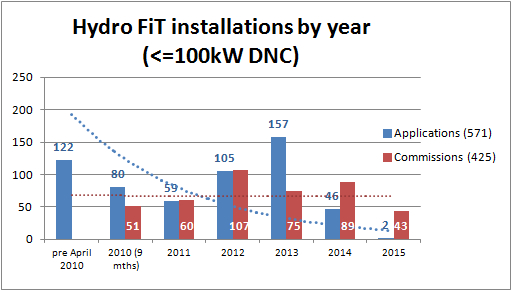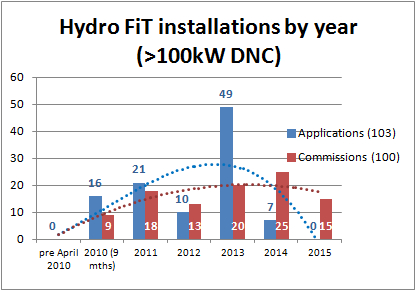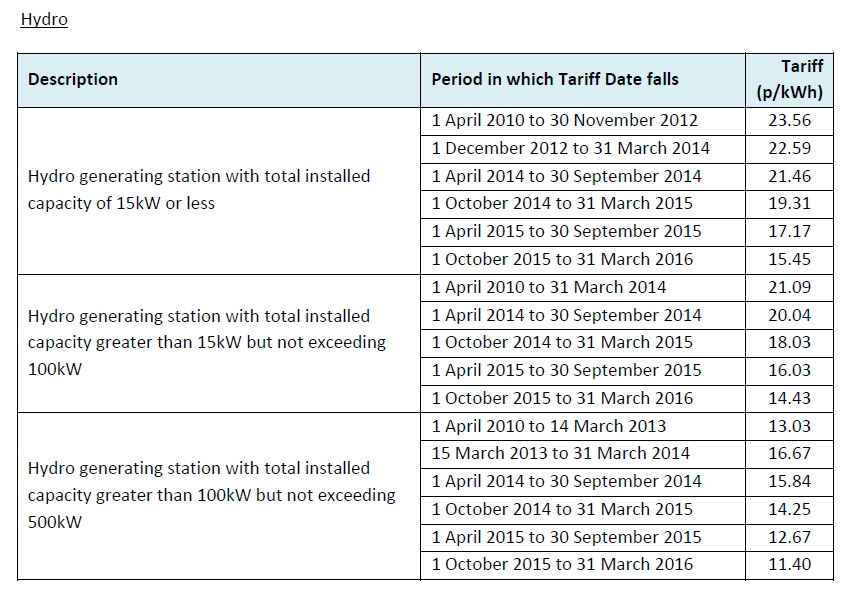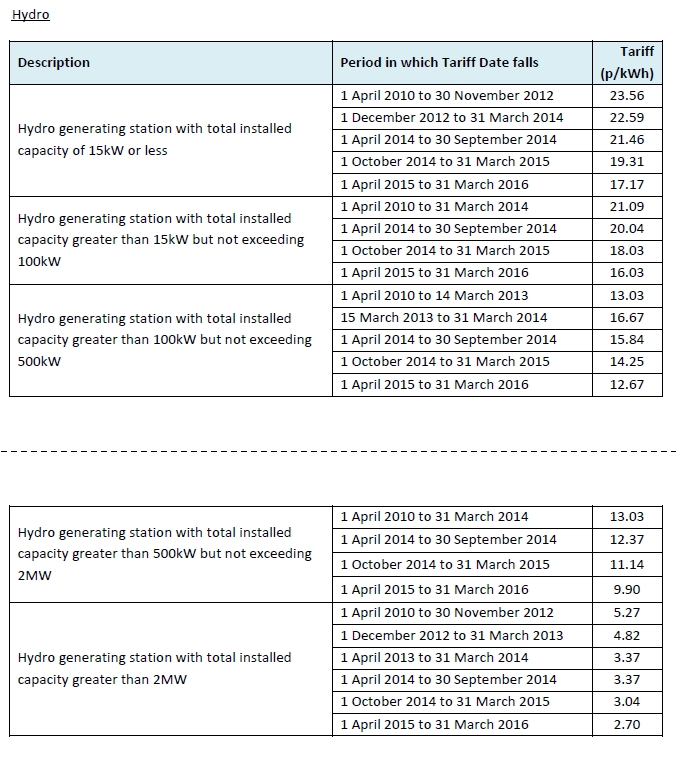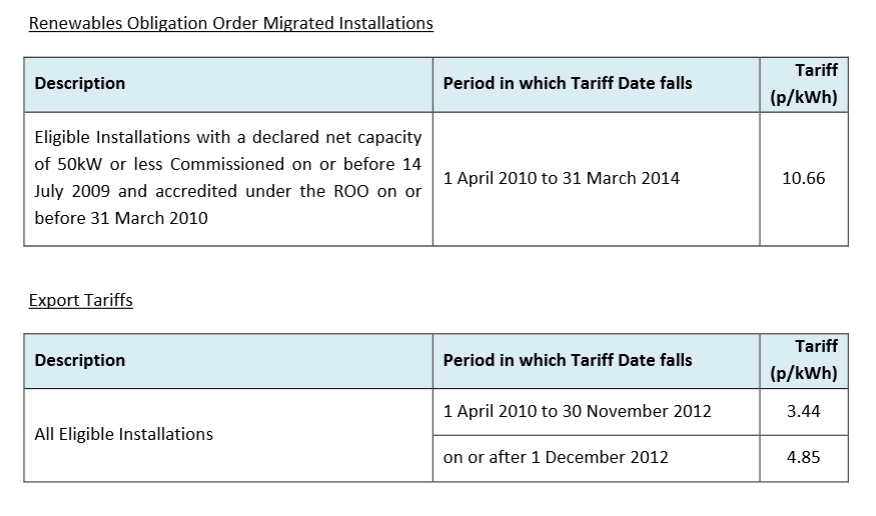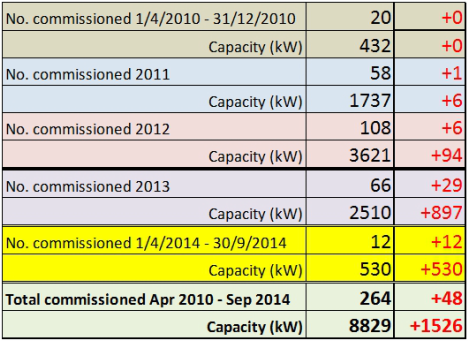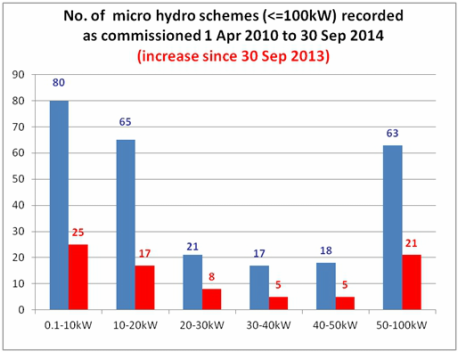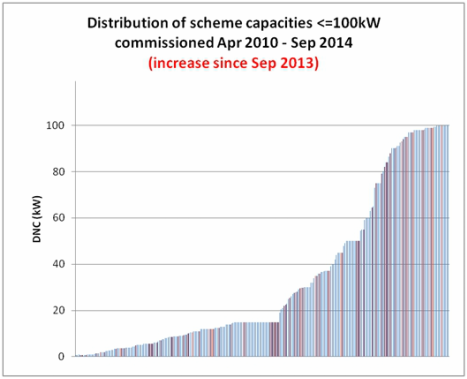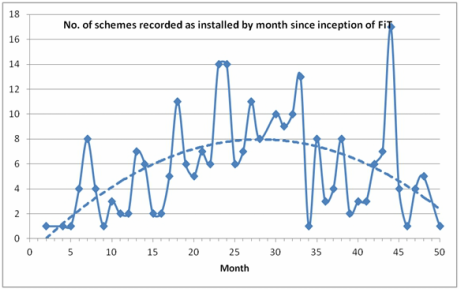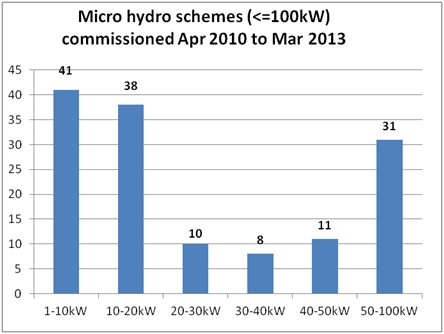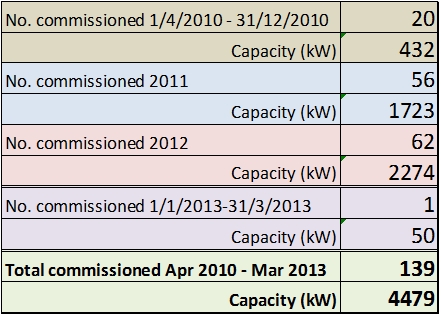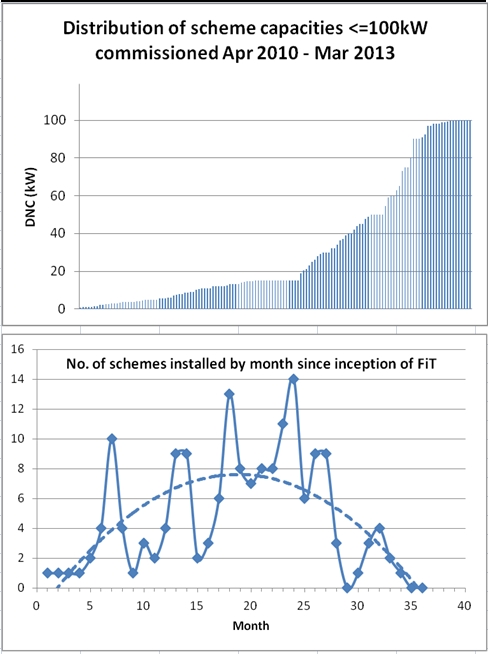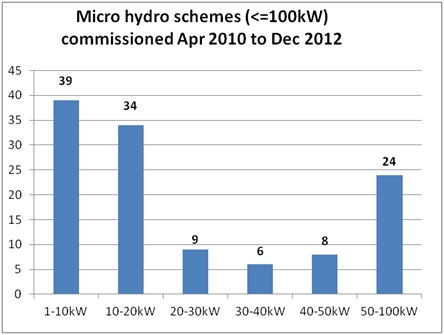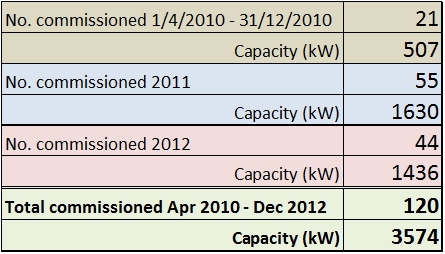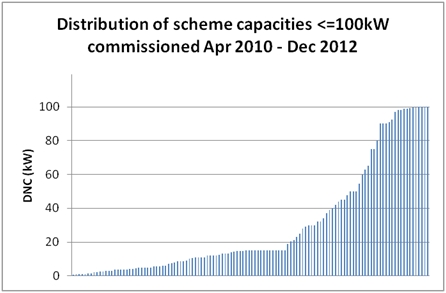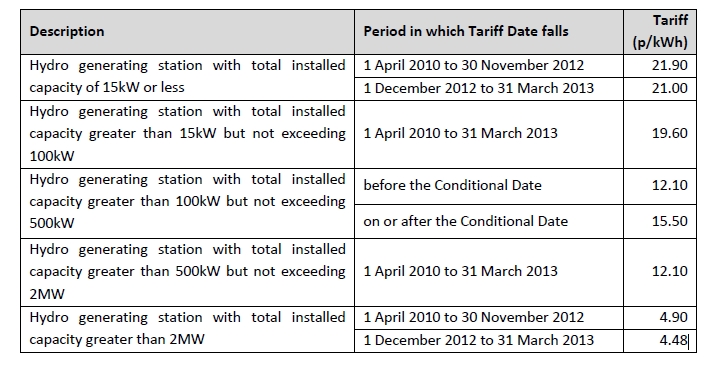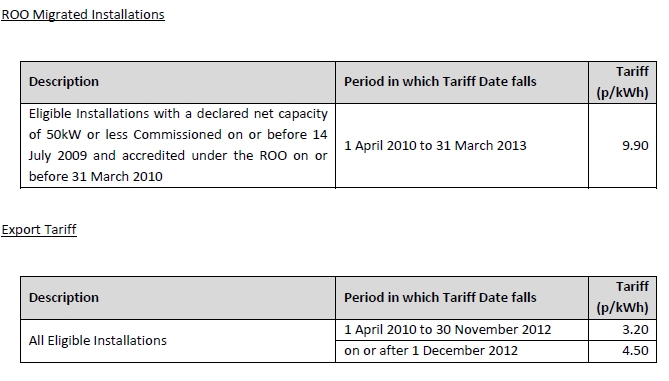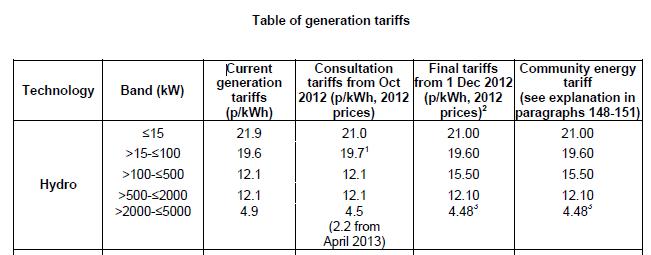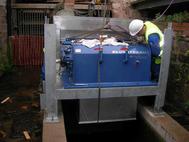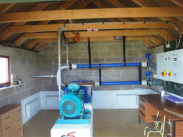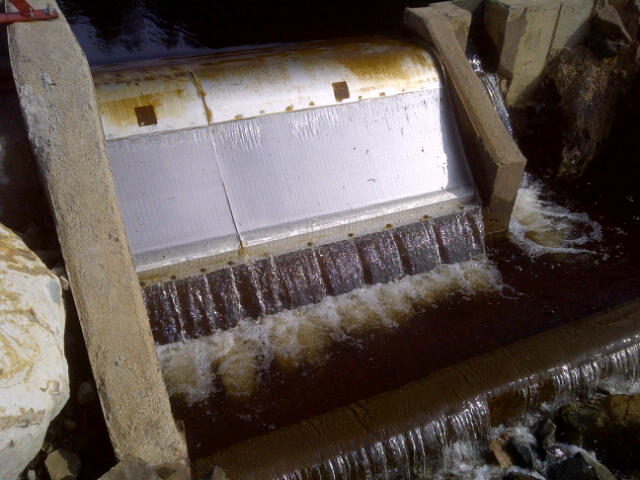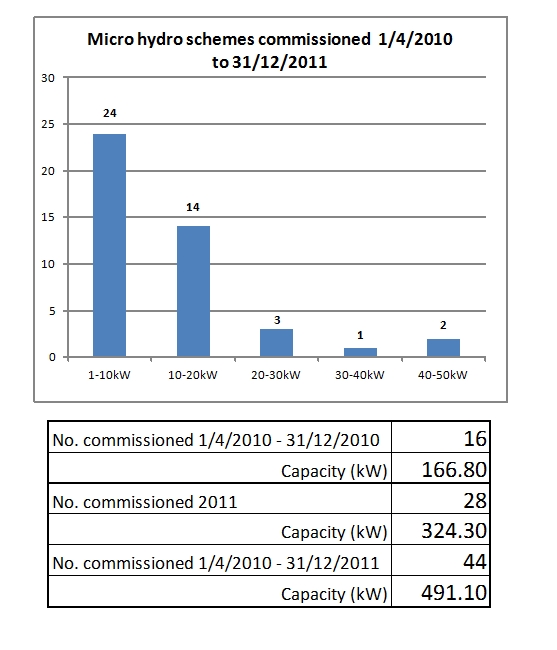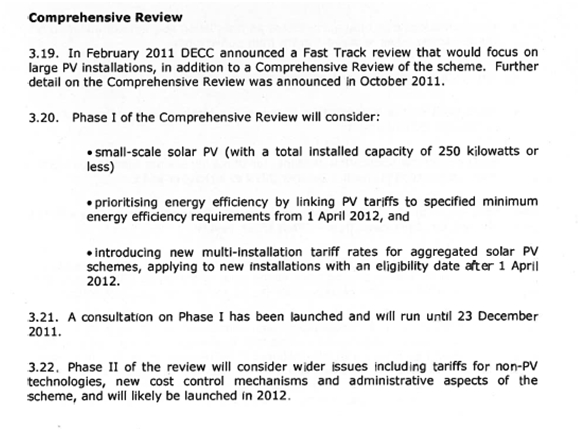Loading
NEW
After many years of running the Micro Hydropower Association we are now to aligning the MHA membership with the British Hydropower Association's remit in supporting Community and Local Energy solutions.
Members of the Micro Hydropower Association are being invited by email to stay connected with small scale hydropower issues through a new web presence being established in association with the BHA. This website site will be archived in due course.
If your email address has changed and you would still like to be connected, please email Kate Gilmartin, MHA administrator and CEO of the BHA, at [email protected]
After many years of running the Micro Hydropower Association we are now to aligning the MHA membership with the British Hydropower Association's remit in supporting Community and Local Energy solutions.
Members of the Micro Hydropower Association are being invited by email to stay connected with small scale hydropower issues through a new web presence being established in association with the BHA. This website site will be archived in due course.
If your email address has changed and you would still like to be connected, please email Kate Gilmartin, MHA administrator and CEO of the BHA, at [email protected]
Supporting community energy ownershipOver the last 10 years, we have seen the rise of the 'Community Energy Movement'. Where communities club together to own their own renewable energy installations as not for profit co-operative societies. Community hydro projects have been prominent across the UK and yield a return for their investors, but also a community benefit fund to be allocated by the members to local good causes.
However, the large policy shifts, brought about by the Conservatives, have seen the Feed in Tariff dramatically slashed and alongside removal of tax incentives, the business model for Community Benefit Societies has been overwhelmingly scuppered. Projects that were lucky enough to have reached a certain stage were able to pre-accredit the Feed in tariff last September and there is now a flurry of projects looking to raise funding to install in this last wave of community renewable energy projects. One such project is ‘Greater Manchester Community Renewables’ who has launched a share offer to fund the installation of solar panels at Primrose Hill Primary School in Ordsall, Irlam Primary School in Irlam, and The Fuse in Partington, and to help Moss Community Energy install panels at Fiddlers Lane Primary in Irlam. This will save these sites money, reduce carbon emissions and inspire children (and grown-ups!) to learn about energy and climate change – and surpluses will go into a Community Fund to support eco-friendly projects in the local community. GMCR has a target to raise £186,000 to ensure that all four sites get their solar panels installed, if you would like to support this project please visit www.gmcr.org.uk/invest or search for @WeAreGMCR on Twitter, or take a look at the GMCR page on facebook. Please pass on this email, ‘like’ GMCR on twitter or facebook, the more people who learn about community energy, the better! Despite this shift in policy landscape, there is much talk about how the community energy sector can continue to grow and this report by 10:10 (Community energy – the way forward) makes for some insightful reading. With so many people opposed to fracking, highlighting the fact that we want to move away from fossil fuels, community energy offers a clean and practical alternative! The Piclo trial - a glimpse into our energy future?
OFGEM - Call for engagement
Open letter: call for engagement on insights for future regulation
Yesterday we announced that we are initiating a new process of horizon scanning. We are doing this because we know the energy system of the future will be very different to the energy system of today. Our role as the energy markets regulator is to protect the interests of existing and future consumers. In order to best fulfil our role we need to understand what is driving system change, the likely impacts on consumers and the implications for regulation. This information will help us set our future priorities for the evolution of regulatory arrangements. For this horizon scanning process to be successful we need your help. This letter explains how you can get involved and what it is that we need from you. Link to open letter: https://www.ofgem.gov.uk/publications-and-updates/open-letter-call-engagement-insights-future-regulation If you would like to be involved, please register your interest by sending us an email: [email protected]. We’ll then get in touch with more information about the workshops and other channels of communication. Consultation on getting an electricity connection when the network is constrained
Ofgem have published this consultation. We encourage all members to respond since in many places grid constraints present a major obstacle for micro hydropower development
Follow the links here to down the consultation document and appendix MHA statement on Feed in Tariff reviewThe Impact of Feed in Tariff Review on Micro Hydro-electric Projects
The Micro Hydro Association (MHA) is shocked by the totally unexpected reduction in FIT for smaller schemes, especially for <100 kW installations. The MHA cannot compute how the new tariffs will yield a 9.2% financial return on investment, as stated by DECC. The proposed FIT will not allow hydro development to be financially viable. The collapse in base price of electricity and the complexity of direct supply does not allow ‘Renewable, no carbon electricity’ to be priced at its worth, leaving the FIT as the only mechanism through which hydro can currently be brought to market. Without a reasonable FIT this industry cannot survive. This will result in the loss of potential sustainable no carbon electricity together with the loss of a highly skilled nascent workforce and valuable working knowledge. In light of the COP21, the MHA is dismayed that the Government are essentially withdrawing support for the Hydro industry. Hydro-electricity schemes can operate for up to 100years. Given this longevity, start-of-life financial support offers better whole life value for money than any other form of energy generation. There are still hundreds of potential hydro sites and weirs around the British Isles which could provide sustainable energy and continue our long tradition of harnessing the power of water, but with the reduction in FIT for hydro, these Micro hydro projects will now be un-viable. DECC’s underpinning reasons for tariff cuts:
Figures below based on Ofgem reports published 8 January 2016 for schemes which have completed accreditation.
17 December 2015 2015 FiT review consultation - Main decisions affecting hydropower
See below
Your browser does not support viewing this document. Click here to download the document.
17 September 2015 Ending of Preliminary Accreditation
Ofgem confirm ending of pre-accreditation and the community tariff guarantee: see open letter 27 August 2015 Comprehensive FiT Review (CFR)
DECC have published an 8 week consultation on their proposals to financially cap or end the Feed-in Tariff scheme altogether. There are four papers: The consultation Impact assessment Review of evidence Cost Update (Parsons Brinkerhoff) This consultation closes at23 October 2015 11:45pm 31 July 2015 Feed-in Tariffs
Ofgem have just published the table here. This includes the latest rates subject to degression (-10% for schemes with tariff dates after 30 September 2015 compared with April 2015 rates). Hydropower rates are shown below: 30 January 2015 Feed-in Tariffs
Ofgem have just published the table here, or download this file. This includes the latest rates subject to degression (-5% for schemes with tariff dates after 30/9/2014 and -15.5% for schemes with tariff dates after 31/3/2015 compared with April 2014 rates). A retail price index uplift of 1.6% has also been applied. Hydropower rates are shown below: previous news (links in the previous news section to pages on other sites may be out of date)
See Blog page for discussions on the items below 10 October 2014 Ofgem list of microgeneration installations to September 2014
The full list is available from Ofgem here (2 large Excel spreadsheets)
Analyses of this data for micro hydro schemes (<=100kW) recorded by Ofgem as being commissioned from 1 April 2010 to 30 September 2014 are given below. EA's Hydropower guidance now live and website has transferred
In addition to the new hydropower guidance going live for all new applications received, the EA's website is transferring to www.gov.uk. You’ll find the new EA guidance here, and the application forms are still found on the Environment Agency pages here.
Please find attached a briefing note on the Environment Agency’s website moving to join www.gov.uk. The MHA response to the EA's consultation on Abstraction reform - consultation closes 28th March
Please respond to the consultation here.
Below are the EA's factors relating to hydropower schemes alongside Defra's reform aims: The EA's aims of reform are in black, the MHA's responses are in red. • Maximise the amount of water available to abstractors; new and existing hydropower have no impact on the amount of water available to abstractors since hydropower is 100% non-consumptive • Promote efficient use of water through charging for actual use; new and existing hydropower have no impact on the amount of water used since hydropower is 100% non-consumptive - hydropower schemes abstract only the kinetic energy of flowing water • Facilitate trade, maximising the economic value from available water and allowing new entrants to access water; hydropower schemes serve only to release economic value from available water with no consumption • Provide reasonable certainty for abstractors for planning their business; Agreed • Protect water ecosystems in line with legal requirements, particularly ensuring that reform does not create risks of environmental deterioration; the legal requirements stem mainly from the EU Water Framework Doirective which seeks to protect and improve the status of Water Bodies. The majority of low impact small scale hydropower schemes have no or insignificant impact on Water Bodies as defined by the Water Framework Directive so should not be made subject to the constraints imposed by the WFD or related legislation. • Ensure the new system is able to respond to longer-term changes in water availability. Hydropower has no long term impact on water availability as no water is made unavailable. We want to do this in a way that minimises the administrative costs whilst still achieving our aims. This is about smarter regulation that reduces the cost to businesses of dealing with the challenges of the future. We also want to make sure we move to a new system in a way that takes into account both current licensed volumes and the amount that abstractors actually take. A registration process will considerably reduce the costs of licensing hydropower abstraction. EA Charges Consultation responsesThe SOUTH SOMERSET HYDROPOWER GROUP has issued this paper in response to the EA charges for abstraction consultation.
They would like people to lobby their MPs in response to the following email chain, which appears to show that the EA Directors have made decisions on the outcome of the consultation, prior to any evaluation of the consultation responses. Suggested email to send to your MP: ---------------------------------------------------------------------------------------------------------------------------------------------------------------------------------------------------------------- Dear , Below is a reply received from the EA on behalf of one of the Directors of the SSHG and Mr Battersby's further email to Lord Smith. The EA Board being asked to approve the charges before the consultation process has been completed is totally unacceptable. It is clear that the EA has not followed the spirit or the letter of the Consultation principles: guidance document published on the Government web sit On examination of the papers sent to the Board, http://www.environment-agency.gov.uk/static/documents/Agenda_and_papers_for_6_February_2014_board_meeting.pdf the only reference that we could find on abstraction charges appear in the income projections for the next three years on page 40, which remain static at £119million per annum. It would appear that the issue of increasing the charges was brought forward under AOB with no forewarning and therefore was an unplanned item for that meeting. If this is correct it is disgraceful and goes against all Corporate Governance best practice. Your help in bringing this latest example of EA arrogance to the notice of Government Ministers would be much appreciated. Best regards, Email chain: Email to Lord Smith from Anthony Battersby, Chairman of the Mendip Power Group 18th February. Dear Chris, Below is an e-mail I have just received from your Agency. It fills me with alarm and despair. What is the point of going out to consultation, taking up the time of a lot of people who responded, if decisions are going to be taken BEFORE the outcome of the consultation has been published. Did the Board receive a copy of the consultation analysis before its meeting on 6 February? As far as I am aware and as far as the South Somerset Hydropower Group has been told, the consultation had not been analysed by 6 February. To those of us who care about the development of hydro and the reduction in CO2 emissions, this looks like a cynical charade. Hydropower is NOT an abstractive industry and it is outrageous that the EA is treating it as such. It is totally counterproductive to lump hydro, the one activity that actually contributes to reduction in global warming, with activities that significantly generate CO2. It is reasonable that the licence fee should increase in line with inflation. It is not reasonable that it should increase by at least 1,100%, without ANY detailed justification of how such an enormous increase has been calculated. I know you have a lot on your plate but this is an issue which needs your close attention. Best wishes Anthony On 18/02/2014 11:42, Bateman, Geoff of the EA wrote: Dear Mr Battersby, Thank you for your recent e mail to Richard Leafe. Richard is currently on leave and I hope the following response will help explain the situation and Richard will respond to you on his return. The consultation on abstraction licensing charges closed on 31 December 2013. We presented to our Board proposals to apply an annual subsistence charge or to increase the application charge to those abstractions not incurring an annual charge. Currently applicants for a range of abstraction licences pay a £135 application charge and no ongoing subsistence charge. This level of income falls significantly short of our costs to carry out administrative aspects of receiving, validating and determining an application for these type of abstractions. Also, with the expected large amount of applications for New Authorisations, as a result of the removal of exemptions for some activities, we are facing a significant unfunded burden. Therefore, we must begin to recover the costs of processing and determining these applications; hydropower is one of the sectors affected by our proposals. We are proposing a new higher application charge of £1,500 which is at the lower end of what we believe our costs to be. In line with the view of HM Treasury and Defra we believe it is appropriate that we apply the higher application charge of £1,500 against all licences that do not attract ongoing subsistence charges. Those hydropower operators that already hold licences will not incur this higher application; if they renew on a same terms basis the renewal charge will be £135. The Environment Agency's Board at a meeting on 6 February gave approval for the proposal to introduce a new higher application charge of £1,500 for all abstraction licences that do not attract an ongoing subsistence charge to proceed. Therefore we are currently working with Defra to produce a formal submission covering all proposed changes to go to the Secretary of State for his approval. We envisage that this will progress over the following few weeks to allow us to publish and implement our new charging schemes by 1 April. Yours sincerely Geoff Bateman Defra's Abstraction Reform Consultation Defra and Welsh Government have published a joint consultation, Making the most of every drop.
They would like your views on the proposed changes and to understand what effect they will have on your scheme. The consultation will end on 28 March 2014. So please have your say: fill in the online survey about changes to how we manage water abstraction Defra and Welsh Government are holding four workshops to help people understand the consultation proposals and to explore some of the issues in more detail. The workshops are in: London - 25th February Manchester - 27th February Peterborough - 4th March Cardiff - 6th March If you would like to attend one of these workshops, please email your contact details and venue preference. FIT report signals 5% degression for Hydro.
The latest FiT report (to 31/12/2013) states the following for hydro:
Feed-in Tariff Installation Report 1 January 2013 - 31 December 2013 Hydro FiT commissioned: Total Installed Capacity: 2,819.50kW Declared Net Capacity: 2,790.38 kW Hydro FiT applications: Total Installed Capacity:2,521.90kW Declared Net Capacity:2,491.99kW However, there is now a new web page published by government: https://www.gov.uk/government/statistical-data-sets/monthly-mcs-and-roofit-statistics with a spreadsheet which includes accreditations and prelim accreditations, both complete and "pipeline" This shows a very different set of figures (in total by month, not in detail by site) It results in 20.348 MW total installed capacity accreditations of which 8.496MW relate to preliminary accreditations. The decision of the Minister (5% degression for hydro because >12.5MW "deployed") has been made, although it would appear that only 11.85MW has in effect been deployed. The MHA will be seeking clarification of this discrepancy. Renewable energy opportunities on National Forest EstateThe Forestry Commission Scotland has just launched what it is calling ‘Residual Offerings’. This is the latest in a series of opportunities offered on the National Forest Estate in Scotland. It is available for applications by both commercial developers and communities and covers hydro, wind, solar photovoltaic and geothermal energy generation. You can read more on the Forestry Commission website about this new opportunity here and read the detailed guidance document here New Good Practice Guidelines for Hydropower released by EA and Natural Resources Wales
The New Good Practice hydropower guidance for England is now live on the Environment Agency’s website: http://www.environment-agency.gov.uk/business/topics/water/126575.aspx
and fro Wales: published on the Natural Resources Wales website http://naturalresourceswales.gov.uk/apply-buy-report/apply-buy-grid/water/abstrations-impoundment/hydropower-scheme/?lang=en From this point forward, pre-application advice for all new hydropower enquiries will be based on the revised guidance. Twelve weeks after publication, on Tuesday 1 April 2014, the revised guidance will become the basis for determining of permit applications, for any new hydropower schemes received and accepted as valid from that date. 12 November 2013 Ofgem list of microgeneration installations to September 2013
The full list is available from Ofgem here (2 large Excel spreadsheets):(FULL OFGEM FIT REPORTS available here: https://www.ofgem.gov.uk/publications-and-updates/feed-tariff-installation-report-30-september-2013) I have extracted data for hydro installations in this spreadsheet (also in pdf format here) Analyses of this data for micro hydro schemes (<=100kW) commissioned from 1 April 2010 to 30 September 2013 are given below:
Your browser does not support viewing this document. Click here to download the document.
DEADLINE FOR RESPONSE: 20 DECEMBER 2013
CONSULTATION ON ENVIRONMENT AGENCY CHARGING PROPOSALS FROM 2014 We invite you to comment on our charging proposals for 2014. Abstraction Charges The licensing of ‘New Authorisations’ (currently exempt abstractions) is a requirement under changes made to the Water Resources Act 1991 by the Water Act 2003. When the regulations come into effect in April 2014 we will be required to licence previously exempt abstractions (‘New Authorisations’) resulting in an estimated 5,000 additional licence applications over the following 2 years. Currently these applications will attract only the £135 application charge and no ongoing subsistence charge. This presents a new, largely unfunded workload and therefore to help address this we propose one of the following options: · to introduce a new abstraction application charge of £1,500 for those permits where there is no requirement to pay ongoing subsistence charges, or · to charge subsistence for all transfer licences in addition to the current application charge of £135. Both of these options would take effect from 1 April 2014. This consultation is in line with the government’s revised consultation principles and will run for 12 weeks from 27 September until 20 December 2013. All responses must be received by 20 December 2013. The consultation documents and its annexes are available to download online – please copy and paste the following link to your browser: https://consult.environment-agency.gov.uk/portal/ho/finance/charges2014/charges2014 Please contact us on 01179 345093 for a printed version of the consultation document. We would prefer you to respond online. However, if you would rather respond by post, please send it to: Alan Day Charges Programme Manager Environment Agency Horizon House, Deanery Road Bristol. BS1 5AH Or email your response by the closing date, using the response form, to: [email protected]. After the consultation, we will review all responses before presenting our final proposals to the Secretary of State for Environment, Food and Rural Affairs. They will consult with other government departments, before a final decision is made. For EU ETS charges we will require the approval of the Secretary of State for Energy and Climate Change. You can also find more information about our charges and charging schemes by accessing: http://www.environment-agency.gov.uk/business/regulation/31853.aspx I look forward to receiving your response. MARK McLAUGHLIN Director of Finance ------
I have copied the Latest news items to the News and Discussion topics Page so that you can use the RSS feed which will be updated every time I add news. You can also comment on the news items on the Blog page. Response to EA and Lord Chris Smith, chair of the EA Board
The Environment Agency Board Decision 17th October
The Environment Agency board will be making their decision on whether to accept the recommendations from the Good Practice Guidelines consultation this Thursday 17th October. Board papers can be found here.
The MHA will be making a response and posting it, prior to the final meeting We welcome any comments or feedback should you wish to have them included in the MHA response. Community energy fortnight
The UK Community Energy Coalition is currently holding a community energy fortnight. As you'd expect there are a fair few Hydro events on around the country including:
Mountain walking tour in Snowdonia Tour of Stockport and Torrs Hydro Chester Weir hydro project Tour of Whitby Esk energy hydro Ham Hydro stall at Teddington festival Click on the links to sign up for attendance. Results from EA board meeting on flow regulation (England only)
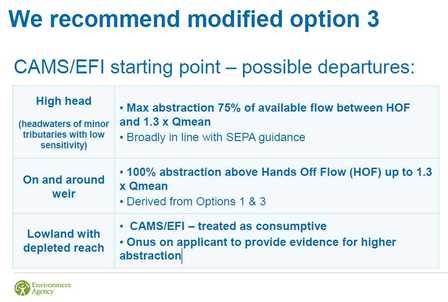
The EA board have requested that the EA Directors responsible for hydropower regulation need to review their work to date, finding more evidence to support their recommendation of 'option 3 amended' from the Flows Supplementary Consultation. This option was presented to us as members of the Hydropower Working Group as a fait accompli without consultation and with no supporting evidence which is the reason that both the British Hydropower Association and the MHA wrote as I posted earlier.
This is the EA summary of ‘option 3 amended’: In assessing potential ecological impact, hydro would be considered 'consumptive' despite water being returned to the river and not consumed using the EA’s standard ‘CAMS/EFI’ approach. Ecology of river would be split into three bands - low medium and high as set out on the catchment abstraction management maps. There has been no indication what percentage takes would be allowed for these varying sensitivity bands. This brief respite (2 months we understand) allows the Hydro industry to reaffirm how best we can work with the EA to bring about suitable site specific schemes, without the narrow parameters suggested by the EA. Let me know if you have any questions, Thanks, Kate Environment Agency Board Decision 17th October
The Environment Agency board will be making their decision on whether to accept the recommendations from the Good Practice Guidelines consultation this Thursday 11th July. Board papers can be found here, item 11.
The MHA have responded to the EA with this response stating our withdrawal from the consultation process and issuing this letter to Chairman of the EA, Lord Chris Smith. We will not be attending the final meeting on Thursday, which has now been made an 'open' session, but with no participation allowed. We will update you on the outcome and welcome your comments and feedback! £15m fund for rural energy projects opens to applications
28 June 2013 Rural communities across England that aspire to generate their own clean green power are being offered a helping hand today with the launch of a £15 million Government fund. The Rural Community Energy Fund (RCEF), which opens to applications today, is specifically targeted at helping rural communities access the money needed to carry out feasibility studies into renewable energy projects, and fund the costs associated with applying for planning permission. It is intended that projects will then be able to attract private finance to pay for renewable energy kit and get projects up and running. Funding can be used to support rural projects across the renewable and low carbon energy spectrum including wind, solar, biomass, heat pumps, anaerobic digestion, gas Combined Heat and Power and hydro. Find out more Ofgem open letter
Please be aware that generators now need to keep records as described in the “Open Letter - Feed-in Tariff (FIT): Guidance for Renewable Installations - Change to Statement of FIT Terms”.
'The Statement of FIT Terms will be amended by the FIT Licensee by 1 October 2013. This amendment will include terms to enable the smooth transition from one FIT Licensee to another in the event of a FIT Licensee failure. The terms will require all FIT Generators to: maintain records of their generation and (where applicable) export meter readings, maintain records of all FIT Payments received, Maintain the above records for a period of one year, commencing with the date on which a meter reading is taken by or supplied to a FIT Licensee, or the date on which a FIT payment is received by a FIT Generator. Please note this condition affects both existing and new FIT Generators.' 18 June 2013 Funding opportunity for hydropower
WRAP (Waste & Resources Action Programme) is finalising Defra’s ‘Rural Community Renewable Energy Fund’ re-launch and taking expressions of interest. It is a mixture of a grant of up to £20,000 to undertake feasibility work and up to £130,000 loan for planning work. The fund is to support Community renewable energy projects, in rural areas in England, with populations of less than 5,000 people. Hydro developments are considered eligible for the fund.’ WRAP can be contacted at [email protected]. WRAP’s summary of the scheme is here. When we hear that the fund is up and running we will post a notice on the News and Discussion topics page. 1 June 2013 The Micro Hydro Association has a new administrator
I am delighted to say that my invitation for someone to take over as administrator of the mha has been taken up by Kate Gilmartin. Kate has excellent credentials having herself set up a forum for communities with potential hydropower schemes to share information and experiences and act as a mutual support group. Kate also acts as an independent advisor on CO2 reduction and is an Associate of CO2Sense. The mha administrator's email address will remain unchanged and for the time being the website will be kept in the same format as now. Following a handover period, during which I will remain involved, Kate will be writing to outline any proposed developments in the structure and constitution of the mha and in its links with others who have similar aims. Building up the mha's membership and its activities over the last 3+ years has been a rewarding experience and I would like to thank the many people who have responded to surveys and supported our attempts to improve the opportunities for micro hydro schemes to be developed. Please contact Kate via [email protected] if you have ideas you would like to see considered or points you wish to raise concerning the way forward for the mha. Gavin King-Smith 19 April 2013 Ten Things to make microhydropower easier
This is an initiative of the River Energy Networks (REN)/Mendip Power Group, a hydropower association in England which gained an opportunity to send the Secretary of State for Energy, Ed Davey, the top ten problems facing micro hydropower. Please complete this form (MS Word format, Adobe .pdf format) and send to Rachel Feilden ([email protected]) or respond directly to the questions as set out in here This could help us all if REN can demonstrate a high number of responses from the industry and potential and actual generators. 8 April 2013 Ofgem list of microgeneration installations to March 2013
The full list is available from Ofgem here (large Excel spreadsheet): Feed-in Tariff Installation Report 31 March 2013 - MS Excel - 41985Kb I have extracted data for hydro installations in this spreadsheet (also in pdf format here) Below are analyses of this data for micro hydro schemes (<=100kW) commissioned from 1 April 2010 to 31 March 2013. (when first published here there was an error in the first chart which showed 63 schemes in the 50-100kW range) 28 March 2013 Environment Agency flows consultation
My final response on behalf of mha members has been sent to the EA. Feel free to add comments on the News and Discussion topics page page 22 March 2013 Feed-in Tariff changes approved by EC
DECC has announced that the European Commission has formally approved the UK notification of State Aid for the changes to the FITs scheme resulting from Phase 2B of the Comprehensive Review. This means that the introduction of the new 100-500kW hydro band, and the increase to the micro-CHP tariff, will be effective from the date of approval, 15 March 2013. Please see the tariff tables on the Ofgem FIT website for the latest rates: http://www.ofgem.gov.uk/Sustainability/Environment/fits/tariff-tables/Documents1/FIT%20Tariff%20Table%201%20April%202013%20Non-PV%20Only.pdf 19 March 2013 PLEASE NOTE AND ACT: micro hydropower development at risk in England and Wales
I have now drafted a response on behalf of the mha to the supplementary consultation by the Environment Agency (EA) on regulating abstraction of water for hydropower. The response is available here. There have been hundreds of responses from people with angling interests who have been led to believe there is a threat from hydropower schemes to the rivers they fish. I am certain that this is not the case for the majority of the small scale hydropower schemes that you generators, potential generators, supporters, and suppliers of services are concerned with. There are now 170 members of the mha let all our voices be heard! DEADLINE FOR RESPONSES: 2 APRIL 2013 23:39 I would ask you to spend the very small amount of time it will take to respond on-line to the EA consultation so that they are not faced with choosing an approach which I believe could act as an extreme constraint on any further micro hydropower development in England and Wales. There are some concerns with “option 1” of the four options presented by the EA, but I and others deeply involved with hydropower, including the British Hydropower Association, consider it the only option of the four that can be acceptable in the short term. For micro hydropower I am, as you will have read before, proposing a much simplified registration process for low impact schemes. I will be including this redraft of the proposed process with my consultation response. The redraft incorporates amendments to cover the comments on the first draft that some of you have helpfully provided (see this version showing the amendments). I will also now be pursuing this draft proposal with DECC, DEFRA, environment agencies and other departments and agencies. So please submit your response to the EA consultation , even if only to select option 1 as your preferred option of the four (unless of course you disagree!). The preferred method of response is on-line here: https://consult.environment-agency.gov.uk/portal/ho/br/standards/hydro or you can send an email or postal response to: Eileen Falkner ([email protected], 01179344185) Environment Agency Horizon House Deanery Road Bristol BS1 5AH 18 March 2013 Feed-in Tariff Factsheet
Ofgem have published an extremely clear factsheet here. This explains clearly the the ROOFIT process of accreditation is now mandatory and the sole route for any hydropower scheme (under 5MW capacity) to become elgible to receive the FiT. 23 February 2013 Definition of Generating equipment for Feed-in Tariff
Ofgem have published the definition as follows: For hydro installations, the “generating equipment” is:
23 February 2013 Public tender for a hydropower pre- feasibility study - SW Scotland - see these links for the invitation and the tender document. There is a tight deadline for response.
28 January 2013 Micro hydro - a case for special consideration
As you know, I have been involved for some time in discussions with departments and agencies on the way micro hydro schemes are regulated and on other matters affecting their development. I have now drafted a paper which proposes ways to lessen the burden both for potential scheme owners and developers, and for agencies and planning authorities. It is alarming that the few suppliers with real experience are now abandoning micro hydro owing largely to the delays and complexities of the red tape - hundreds of valuable schemes risk delay or abandonment otherwise. Please contribute your comments and ideas on the mha website by following this link. 21 January 2013 Environment Agency consultation on flow standards
The EA has today published their supplementary consultation on flow standards for regulating hydropower abstraction. It is vital for securing the hydropower industry's existence and ability to contribute to reducing greenhouse gas emissions, and for the ecology of watercourses, that the Agency adopts a rational approach to setting both risk based and proportionate guidance and permitting rules. The EA proposes four options but does not limit responses to those. I will be posting a draft response to the consultation on this website and distributing it to mha members by email, inviting comment before a final submission on behalf of the mha. The consultation document is also available here. Note that EA's Option 1 is basically emulating SEPA guidance for high head schemes already in place for Scotland. The consultation is open for 10 weeks closing on 2 April 2013. 18 January 2013 Ofgem list of microgeneration installations to December 2012
The full list is available from Ofgem here (large Excel spreadsheet): Feed-in Tariff Installation Report 31st December 2012 - MS Excel - 38986Kb I have extracted data for hydro installations in this spreadsheet (also in pdf format here) Below are analyses of this data for micro hydro schemes (<=100kW) commissioned from 1 April 2010 to 31 December 2012. 21 December 2012 Update to Environment Agency Guidelines
The EA has published supplementary notes replacing sections of the GPG1 guidelines in advance of the publication of GPG2 now promised "in the third quarter of 2013". See this blog entry. 20 November 2012 Feed-in Tariff modifications from 1 December 2012
DECC have just publicised the orders that will implement the FiT changes which were announced on 22 July (see entry here). The problem with a single band for hydro schemes in the new degression mechanism remains (once a few big schemes have been completed the tariff will drop sharply, affecting many potential smaller schemes). There are supposed to be 40 days for parliamentary scrutiny of these orders, but they are not likely to be adjusted at this stage. The announcement came today but there are now only 4 (correction) days remaining to review the draft standard conditions which state the degression rates. DECC's announcement and links to the documents are below: "Following announcement of the Government Response to Consultation on Comprehensive Review Phase 2B in July, we have recently laid the two aspects of legislation in Parliament. Subject to parliamentary scrutiny, the decisions will therefore be implemented on 1 December 2012. You can view the FITs order 2012 on the legislation website. A draft of the modifications to the standard conditions of electricity supply licences can be found on the DECC website. Ofgem will release updates to their guidance on their website in due course. You may also like to know that we release updated statistics relating to the FITs scheme on the DECC website each week. Information about the degression policy can be viewed on the DECC and Ofgem websites." 19 November 2012 Results of survey of installers and suppliers - and a request for your views
16 October 2012 OFGEM have published the revised Feed-in Tariff table to have effect until 31 March 2013.
Hydro scheme figures below (from mha administrator) Renewables Obligation (RO) and Feed-in Tariff schemes changes
DECC has dropped proposals to disallow the option for schemes between 50kW and 5MW to register under the RO. See DECC announcement. (apologies for earlier error in upper limit) MCS survey re hydro product certification and installer standards Following the response released by DECC on the FITs 2B consultation, MCS is now asking for open comments from the industry as to whether it should continue to maintain and develop its hydro product certification scheme requirements and installer standards. They have created a short online survey here: Link to survey. Please respond individually. As a previous participant in the MCS hydro working group I shall be responding with my view that the MCS process and standards are not suitable for micro hydro schemes, whose design and implementation should be site specific, and therefore that their maintenance or development should not be continued. 1 October 2012 EA Consultation on Good Practice Guidelines - update The EA has advised the consultees of interim arrangements and provisional revised timescales here. They expect to recommence hydropower working group meetings in 2013 14 September 2012 Hydropower and fish You may have read or heard about an article in the Spectator magazine. entitled "Something’s fishy: Hydroelectric power is bad for the taxpayer and bad for the environment. Why does no one say so". The British Hydropower Association has written a balanced response to this article which I endorse. 2 August 2012 The final response submitted to Consultation on Proposals for an Integrated Framework of environmental regulation (SEPA) is here 27 July 2012 Draft response to Consultation on Proposals for an Integrated Framework of environmental regulation (SEPA) I have drafted a response to the consultation here. Please comment on the blog entry if you have any changes to suggest and please submit your own responses to SEPA directly to this email address using their form. Responses must be received by 4th August 2012 - see alo previous blog entry 22 July 2012 Feed-in Tariff consultation announcement DECC have announced the changes from 1 October and 1 December 2012 here. I have extracted decisions relevant to micro hydro from the Government response following the consultation and added my initial comments here. Key points differing from the present arrangements are:
_
1 July 2012 EA consultation on hydropower Good Practice Guidelines - Update The EA has now confirmed how it proposes to re-activate the consultation by issuing the following to the hydropower Working Group: "Programme
way forward. I will post developments on the mha website. 21 June 2012 Feed-in Tariff consultation - additional ideas for improvement As mentioned in the posting opf 21st February below, and following discussions with members of the mha and others, I have prepared a separate document to the formal consultation response containing further ideas for improvements to the FiT. Please see the blog entry and add your comments. 18/21 June 2012 Scottish Government planning application fees consultation ***ENDS Friday 22 June*** I have only just learnt of this consultation which proposes a new household planning fee for extensions and alterations including microgeneration of £100-£200 and new classes of business planning fee for energy developments. It is not spelled out what fee will apply to micro-hydro. The business class for energy developments is divided into Wind Farms and Other. The new minimum fee for Other proposed is £1000 for the first 100 sqare meters based on "site size or floor space". There is no clarification of how this would apply to hydro schemes. This is almost three times the current charge. Thanks to those who commented on the draft response. I have now submitted a response to this consultation and invite additional comments on Blog page. Please also submit your own responses here: Fees for Planning Applications 2012 Start date 28/03/2012 - End date 22/06/2012. 15 June 2012 EA internal documents for hydropower licensing The Environment Agency (England and Wales) have released some of their internal documents which provide guidance to their staff in carrying out abstraction and impoundment licensing processes. I am publishing this list on the mha website here as it is not currently available for access on the EA website and may be useful for applicants, particularly those with high head sites which are not currently covered in the external EA guidelines "GPG1". 11 June 2012 Microgeneration Certification Scheme (MCS*) - consultation A consultation has been announced by Gemserv, who run MCS, on guidelines for assessing competencies of individual installers and installation companies. Micro Hydro is covered in the consultation. The consultation ends at 5pm 9 July 2012. *MCS certification is not available or planned for micro hydro products and installers (though some installers and products have been registered with MCS under "transitional arrangements"); the current DECC Feed-in tariff consultation (see earlier entries) is, however, still considering whether MCS will have some role in certification for micro hydro. 20 May 2012 Environment Agency Hydropower Good Practice Guidelines I have heard from the Environment Agency (EA) that they plan a further limited consultation on flow standards before finalising the consultation process on the Hydropower Good Practice Guidelines (GPG) on which work started 15 months ago. As a result of the delay in revising the guidelines, the EA has decided that only the present GPG1 low head guidance (link currently here) will apply until further notice. More details and advice on licensing of high head schemes are on the Blog page. 15 May 2012 New consultation on environmental regulation (SEPA) I have just discovered that The Scottish Government is consulting on significant changes to SEPA's regulatory regime. I will post a draft response from the Micro Hydro Association and invite comments before making a final submission. See blog entry for more detail. 25 April 2012 Final response to Feed-in Tariff DECC consultation I have submitted this response to the consultation - thank you to all those who have contributed. 19 April 2012 Draft response to Feed-in Tariff DECC consultation 11 Comments I have updated the draft of 21st February and am inviting comments from mha readers on this page before final submission by 26 April. This is probably the last opportunity for several years to improve the conditions for potential micro hydro developments so please make your comments here or, if lengthy, send me an email. This is so that there is some indication of the support or otherwise from the mha members and others with an interest in micro hydro. The final draft of the mha response can be downloaded here. Thank you for your input 30 March 2012 Ofgem have issued updated guidance for generators here Members of the Micro Hydro Association and other Hydro industry stakeholders attended a meeting with DECC on 29th March to discuss implications of DECC's proposals for the Feed-in Tariff scheme from October 2012 as set out in the current consultation. I will be posting further information before the consultation closes on 26th April. 11 March 2012 - Updated links for access to flow data and river levels for UK watercourses - see Technical Information section of the Useful Information page 27 February 2012 - Updated links for Grid Connection procedures and documents - see Technical Information section of the Useful Information page 27 February 2012 - Report on meeting at the Environment Agency (EA) - An update on the status of the EA consultation on hydropower regulation 25th February 2012 MCS installer standard Gemserv have published an updated (20/02/2012:) version of the "Standard" for installers 22nd February 2012 Ofgem consultation on transmission issues Ofgem have published a letter inviting comments on transmission issues and their control of pricing. I have offered to assist in the consultation and will be asking for support from members. This could be an opportunity to raise issues micro hydro schemes are having with the restrictions placed by DNOs on embedded generation and with delays and high costs. 21st February 2012 Draft for response to Feed-in Tariff DECC consultation I am in the process of responding to the “Feed-in Tariffs Scheme – Consultation on Comprehensive Review Phase 2B: tariffs for non-PV technologies and scheme administration issues”. The comprehensive FiT review follows a strategy review for Microgeneration in 2010/2011 to which I submitted a response. In my opinion an opportunity is being missed at this point to address issues with the FiT scheme as applied to micro hydro schemes. I had hoped that a broader consultation on the FiT scheme would have addressed these issues. I am therefore planning to submit a response in two parts:
I will attempt to incorporate your suggestions before my final submission (due 26th April 2012). I also encourage you to respond to the consultation yourself online at this DECC web page or using the consultation response template. A related paper is still outstanding to be published on this DECC webpage: “the draft Impact assessment will be available here shortly”. This may result in further comments. I am working on the wider proposal and will decide later on how to pursue this. 15th February 2012 Feed-in Tariff April 2012 - March 2013 Ofgem have published the revised tariff today 11th February 2012 Feed-in Tariff Comprehensive Review - Consultation I attended a roundtable meeting on 9th February where Greg Barker announced the review to representatives from the industries affected by the Feed-in Tariff and invited initial comments. The consultation (link here) is now under way. I will be submitting a response on behalf of the mha and will shortly post a draft here for input from members. Final responses are due by 26 April 2012. I was not able to download the papers before the meeting so will be responding to the Minister in writing with initial impressions this weekend. When I spoke to him at the meeting he told me he was keen to see more micro hydro development and that he had earlier spoken in Parliament. This is what he said at the end of his question time (mostly concerning solar technology): "This package of measures is good news for hydro. We are very ambitious for the hydro sector . . ." I am encouraged that the team at DECC are now taking a more flexible approach to the Feed-in Tariff and that there will be greater certainty and in due course less red tape for micro hydro. 19th January 2012 Feed-in Tariff Comprehensive Review It appears that there may be an announcement by 9th February about the proposals for reform that will form the basis of the comprehensive review and consultation. See the extract below from a ministerial announcement today concerning Solar PV FiT rate changes: ". . . We are intending to announce the outcome of the consultation by 9 February 2012, in time for any resulting legislative changes to come into effect from 1 April 2012. Our aim is that this announcement will be accompanied by a set of reform proposals for the next phase of the comprehensive review of the FITs scheme, which will be the subject of a further consultation. . . ." |
To have changes to the News pages notified to your email account we suggest you might sign up to Blogtrotter here. Simply copy the link (URL) below and paste it into the appropriate field in Blogtrotter and add your email address.
http://www.microhydroassociation.org/1/feed The pictures below give a flavour of some other current and potential schemes: |
|
DECC has also now given some indication of the scope of the comprehensive review on this page - see extract below:
"The review is considering all aspects of the scheme including:
Ofgem has published two reports on renewable energy schemes including hydro and the feed-in tariff. Unfortunately Ofgem do not collect detailed information on energy produced by individual schemes so the information, apart from numbers of registrations and capacity, is of limited value. The FiT report contains some confusing figures for energy generated and exported which I am querying with Ofgem.The FiT report for 2010 to 2011 is here and the installation report can be opened by following this link - beware the size of the Excel spreadsheet: Feed-in Tariff Installation Report 31 December 2011 - MS Excel - 15901Kb I have produced extracts of the installation report showing micro hydro schemes only here and a summary below: _4th January 2012 Feed-in Tariff - Comprehensive review - latest
Further uncertainty for the year ahead - the review, originally scheduled to begin in 2011, is is now only "likely" to begin in 2012. This is an image from Ofgem's Feed-in Tariff (FIT): Annual report 2010-2011 - see paragraph 3.22: |
_31st December HIGHLIGHTS AND LOWLIGHTS OF 2011
Below is a summary of the key events affecting micro hydro during the year, the activities of the administrator, and some thoughts for the mha’s future.
Feed-in Tariff, MCS
In April, DECC extended by six months the transitional period in which micro hydro schemes could obtain accreditation for FiT eligibility under Ofgem’s ROOFIT process, rather than being required to go through MCS. Then in June, DECC announced that micro hydro would be decoupled from what DECC termed “the exclusive link with MCS”, stating that further consideration would be given in the “Comprehensive FiT review”, and extending the ROOFIT period for a further six months to 1 April 2012. (There are as yet no Certification Bodies offering or planning to offer MCS product or installer certification.)
DECC rescheduled the Comprehensive FiT review and associated consultation for the end of 2011 but as yet have neither made an announcement as to its purpose, content, nor given a start date. Given the issues arising from the fast track review of the FiT for solar energy schemes, this leaves it unclear as to the support that all other renewables technologies, including micro hydro, can expect from the FiT in the future.
Environment Agencies
The Scottish agency (SEPA) concluded the consultation on updating their hydropower guidance and the English and Welsh agency (EA) started theirs. In both cases, the agencies are adopting an increasingly precautionary approach, partly owing to heavy pressure from fisheries and angling interests and from Natural England and Scottish Natural Heritage. For micro hydro schemes, the guidance given to landowners and developers often appears to be overkill when considering the very small scale impacts these schemes can have on the environment and ecology of a catchment area, a river basin, or the UK as a whole.
SEPA are still reviewing their licensing procedures, establishing “virtual” licensing teams, and tending to follow the guidance to the letter rather than the spirit.
Below is a summary of the key events affecting micro hydro during the year, the activities of the administrator, and some thoughts for the mha’s future.
Feed-in Tariff, MCS
In April, DECC extended by six months the transitional period in which micro hydro schemes could obtain accreditation for FiT eligibility under Ofgem’s ROOFIT process, rather than being required to go through MCS. Then in June, DECC announced that micro hydro would be decoupled from what DECC termed “the exclusive link with MCS”, stating that further consideration would be given in the “Comprehensive FiT review”, and extending the ROOFIT period for a further six months to 1 April 2012. (There are as yet no Certification Bodies offering or planning to offer MCS product or installer certification.)
DECC rescheduled the Comprehensive FiT review and associated consultation for the end of 2011 but as yet have neither made an announcement as to its purpose, content, nor given a start date. Given the issues arising from the fast track review of the FiT for solar energy schemes, this leaves it unclear as to the support that all other renewables technologies, including micro hydro, can expect from the FiT in the future.
Environment Agencies
The Scottish agency (SEPA) concluded the consultation on updating their hydropower guidance and the English and Welsh agency (EA) started theirs. In both cases, the agencies are adopting an increasingly precautionary approach, partly owing to heavy pressure from fisheries and angling interests and from Natural England and Scottish Natural Heritage. For micro hydro schemes, the guidance given to landowners and developers often appears to be overkill when considering the very small scale impacts these schemes can have on the environment and ecology of a catchment area, a river basin, or the UK as a whole.
SEPA are still reviewing their licensing procedures, establishing “virtual” licensing teams, and tending to follow the guidance to the letter rather than the spirit.
The EA have yet to complete their consultation assessment and publish their new guidance for “small and micro scale hydropower”. This is likely to happen in the first quarter of 2012. I am faintly optimistic that there will be some attempt to incorporate a proportionate approach to licensing the smaller scale schemes that the mha and its members are concerned with.
Micro Hydro Association
membership
The mha has grown from 99 members at the end of 2010 to 135 members at the end of 2011. There are 80 current and potential generators and supporters, and 55 who offer supplies and services.
mha forum
Use of the forum by those who have joined (74) has been very limited and I feel that it has not come into its own. Only 15 of the 74 logged in after joining the forum and 23 were removed after not applying for membership of the mha within 2 weeks.
I would welcome views on this, but propose to keep the forum open in case a need arises for the mha to support open discussion.
administrator activity
At the start of the year I ended my involvement with development of standards for the Microgeneration Certification Scheme, having comcluded that the approach being taken by DECC/Gemserv was unworkable for hydropower. Later, I contributed to an unofficial review of MCS being undertaken by a consultant to the DECC Minister, Greg Barker. I have asked to see the report but none has been forthcoming.
During the year much of my time relating to the mha has been taken up attending meetings with the Environment Agency (England and Wales), mostly by teleconference and occasionally on EA premises. The EA invited the mha, and the British Hydropower Association, to help to steer the EA in its production of an updated set of guidelines for “small and micro scale hydropower”. I have attempted to supplement valuable input from BHA members by constantly drawing the EA’s attention to the absence of proportionate consideration for micro scale schemes and suggesting ways to incorporate this.
I have also met with the Scottish environment agency and with a member of the Scottish Office with responsibility for onshore hydro who visited a number of micro hydro schemes recently built and installed in Dumfries & Galloway by mha members.
I have maintained the website www.microhydroassociation.co.uk, and established a new parallel site www.microhydroassociation.org to take over when Microsoft switch off the Microsoft Office Live service and cease to host either the mha site or the mha email addresses; this is scheduled for 30 April 2012.
future of the mha
For 2012, I invite members to volunteer to take over the administration of the mha as I would like to reduce my involvement. A number of members have suggested that the association should seek some funding for this work which is at present unpaid (by design). Don’t all rush to apply but all offers will be considered!
It has also been suggested the mha could itself set up processes to accredit installers and products in the micro hydro sector; an applicant would need to convince existing experienced members of his/her understanding of (micro) hydro design principles and the essential legal requirements for building and installing schemes, as well as possessing, or having access to, the skills needed. Perhaps this could be done in co-operation with an organisation developing training services?
I wish a very Happy New Year to all mha members – may many more micro hydro schemes be commissioned in 2012.
Ends
19 December 2011 Environment Agency charging consultation
My final response to this consultation is here (see entry of 11 November below). Thanks to those who sent in their views which I have tried to incorporate. If you wish to add further comments, you can use the discussion forum.
11 November 2011 Environment Agency charging consultation
I have been advised of this consultation which runs from 28 Sep 2011 to 21 Dec 2011. Amongst other changes, it proposes a new regime for charging for pre-application advice for abstraction licensing following 15 hours free advice. I have drafted a response here and invite your views before I submit it. I also encourage you to respond to the consultation independently. Here is a copy of the consultation paper.
8 November 2011 Eligibility for the Feed-in tariff, MCS and alternative certification for micro hydro
Further to DECC's proposal that the “exclusive link” between micro hydro and MCS will be “withdrawn” (see previous news 30 July 2011 and earlier), and that this issue will be addressed when the Comprehensive Review of the Feed-in Tariff (FiT) for technologies other than solar PV is completed (“around the end of 2011”), I have once again asked DECC whether any clarification of the exclusive link statement can yet be given or when and by what process the issue will be addressed. I have just received a partial answer from a member of the team originally dealing with MCS (my italics):
“The current FITs accreditation situation is set out here:
http://www.decc.gov.uk/en/content/cms/meeting_energy/microgen/micro_hydro/micro_hydro.aspx. In essence, this means that until next April, ROO-FIT is sufficient to access FITs.
As you know, part of the FITs review work will address alternative accreditation for micro-hydro and something should go out before New Year. Since accreditation is a FITs led issues, not mine, my personal guess is that there will be various options presented to the industry. Accreditation for FITs and standards is one on which Minister said the industry should decide, not DECC. In your position at this stage, I would ensure the industry develops a coherent and informed economic view regarding post-installation certification/accreditation (e.g. Gastec’s), to ensure everyone would prefer that, if it is “offered”.
As for MCS, the temporary lists are still open presumably on a voluntary basis. Rick and the working group seems to be doing some work on the MCS side too – but not at our behest. BRE does not seem to be planning to deliver it at this stage simply because of the industry’s decision to detach it from FITs. . . . .”
I think it will be useful for the micro hydro community to review carefully the proposition of design and post-installation reviews should this emerge – it will presumably mean a direct cost to the end users but this should give them a better assurance and better transparency than would be the case with the hidden costs of MCS accreditation.
31 October 2011 Comprehensive Review Phase 1 of the Feed-in Tariffs scheme, focusing on Solar PV
DECC announced this review today. Microhydro schemes will be covered later in the year, a delay from the original intention - see extract below (my highlighting):
"The consultation is the first of two on the comprehensive review of the FITs that were announced at the start of the year (in addition to the fast-track review, which has now been completed). DECC will be publishing a separate consultation around the end of 2011, which will consider other aspects of the scheme including tariffs for other technologies."
Seminar on low head hydropower 7 November 2011
An EU-funded project Hylow (Hydropower with very low head differences, - see www.hylow.eu and details here) are organising a seminar / workshop on latest developments in low head hydropower at Southampton University on 7th November 2011.
20 October 2011 Renewable Obligations Banding Review
DECC have announced a consultation on Renewable Obligations tariffs. These do not affect micro hydro (below 50kW capacity) but may indicate the direction of the Feed-in Tariff consultation also due to take place this autumn.
The press notice is here.
20 October 2011 OFGEM Consultation on definition of generating equipment
This consultation closes on 21st October (see entry of 29 September below).
I have responded to the consultation as follows:
I propose the inclusion of a clarification on these lines:
“The Generating Equipment previously used in another ROO- or FiT-accredited Generating Station would not cause a new Generating Station using a different water resource to be excluded from FiT eligibility.”
This is because it is the Generating Station that is made eligible for the FiT. If a new Generating Station were to be excluded from eligibility it would defeat the combined purposes of the FiT which are both to increase the generation of electricity from renewable resources and to stimulate investment in the infrastructure required. The accredited Generating Station from which Generating Equipment had been removed would no longer be receiving the FiT unless it had been refurbished with replacement Generating Equipment.
Tour of hydro schemes 15 and16 October 2011
The South Somerset Hydropower Group and the Mendip Power Group are hosting another of their popular hydropower tours over the weekend of 15th and 16th October. An extra screw turbine is included this time, to add to the variety of sites. You can also see the details on their website at http://www.gantsmill.co.uk/hydropower.htm#tour or download an application form.
4 October 2011 Feed-in Tariff registrations
Here are the details of hydro schemes registered for the FiT since 1 April 2010, extracted from OFGEM's latest quarterly report.
2 October 2011 Red Tape Challenge (see entry for 4 September below)
The consultation for Environment regulation closes on 3 October. There is no legislation or regulation listed for comment that refers specifically to micro hydro, but I have made this submission. There will be another opportunity to comment on Energy legislation and regulation in November - see website: http://www.redtapechallenge.cabinetoffice.gov.uk or send a submission to the Red Tape Challenge Team at [email protected].
29 September 2011 OFGEM Consultation on definition of generating equipment
This consultation closes on 21st October. It includes consideration of what constitutes hydro scheme plant for the purposes of accreditation under the ROO-FIT process (which is currently running alongside the transitional MCS scheme for access to the Feed-in Tariff - see entry below of 30 July).
22 September 2011 Environment Agency HYDROPOWER GOOD PRACTICE GUIDELINES consultation
Thanks to those who have commented on my draft or have made their own responses on-line. My final response from the mha went in today. It is here.
I have modified my general comments and have included (red text) detailed comments/modifications I have received from mha members and others.
The consultation closes tomorrow 23rd September. After this the EA, supported by the hydro working group, will consider all the responses and issue an updated guidance document – currently rescheduled for the end of February 2012.
The EA is also planning shortly to issue interim guidance to their officers on some aspects.
8 September 2011
The Environment Agency HYDROPOWER GOOD PRACTICE GUIDELINES consultation
I have now drafted a response for comment before I submit it to the EA. I am emailing all members and others to ask people to respond to the consultation and also to let me have views on my draft (MS Word version here, and .pdf version here). The papers referred to in the consultation questions are here: Part 1, and Part 2.
Please submit your individual responses on the EA website: https://consult.environment-agency.gov.uk/portal/ho/br/gpg/review
4 September 2011
Reminder: The Environment Agency HYDROPOWER GOOD PRACTICE GUIDELINES consultation closes on 23 September
I have been involved with the hydropower working group set up by the EA to prepare and run the consultation and will also be submitting a response on behalf of the Micro Hydro Association. I will email members first and post a draft here for comment before I submit this response.
and a new consultation by DECC and DEFRA
This could be an opportunity to illustrate to the government some of the delays and difficulties in planning and environmental application processes as they affect micro hydro schemes.
Below is an abstract from the announcement - for full details see the web link:
"As you may be aware, the ‘Red Tape Challenge’ was launched in April to open up Government regulation to the scrutiny and challenge of the public, businesses and experts. The website is being used to gather innovative ideas on how the aims of our regulations can be fulfilled in the most successful and least burdensome ways. Ultimately, we hope to encourage greater personal responsibility and remove barriers to growth by freeing up businesses from red tape. . . .
. . . .We are looking for all of our stakeholders – the public, businesses, local authorities, representative bodies and non-governmental organisations – to tell us how our policies are working in practice and what can be done to improve them. The more specific you can be the better – we are looking to make real difference to how our objectives are achieved. Please do comment on the website: http://www.redtapechallenge.cabinetoffice.gov.uk or send a submission to the Red Tape Challenge Team at [email protected]".
30 July 2011 Eligibility for the Feed-in tariff and MCS micro hydro standards (corrected/updated 24 June)
There has been an update from DECC stating that the amendment to the FiT order (no 2) will now extend the "ROO-FIT" period to 31 March 2012, not October 2011 as previously announced.
Below is the statement (however the external link to the order is incorrect and should be to this document - also available here):
Micro hydro certification and access to Feed-in Tariffs (FITS) In June 2011 the Coalition published a Microgeneration Strategy which proposed to withdraw the exclusive link between micro hydro and the MCS for the purpose of FITs eligibility. It also confirmed that the comprehensive review of FITs is considering how this can be taken forward. We will consult on the comprehensive review later this year. The review will be completed by around the end of 2011 with any resulting changes introduced from April 2012 (unless the review reveals a need for greater urgency).
In the meantime, and pending the outcome of the comprehensive review, the Feed-in Tariffs (Specified Maximum Capacity and Functions) (Amendment No. 2) Order 2011 [External link], which was laid in Parliament on 8th July 2011 and will come into force on 1st August 2011, extends the current transitional arrangement. This means that micro-hydro stations (with a capacity of 50kW or less) that are first commissioned between 1st April 2010 and 31st March 2012 will need to be accredited for FITs under the ROO-FIT process, administrated by Ofgem.
1 July 2011SEPA Better environmental regulation consultation (completed)
See Response to the Better Environmental Regulation: SEPA's Change Proposals Consultation
1 July 2011 Environment Agency HYDROPOWER GOOD PRACTICE GUIDELINES consultation (new)
(See also entries for 8th March 5th April and 20th April below)
The EA has published a consultation today. It will run for 12 weeks, closing on 23 September 2011.
Full details of the consultation can be found on the EA website at: https://consult.environment-agency.gov.uk/portal
We and the British Hydropower Association will be considering how best to respond as associations - I will post notes here and email members shortly.
22 June 2011 Eligibility for the Feed-in tariff and MCS micro hydro standards (corrected/updated 24 June)
There has been announcement today from DECC/Greg Barker Minister of State. Full details of the MCS/FiT link for micro hydro can be found on the DECC website - we are seeking clarification and further details from DECC.
Below is an extract from the microgeneration strategy document where it refers explicitly to micro hydro: (my highlighting):
3.19 Micro hydro continues to make progress. Many of the applications are unique but some of the subsystems are repeatable. As Britain acquires knowledge in this and other technology areas, there may be scope to share this information with partners overseas, to the benefit of the UK economy. A specific area for development is to increase the pool of competent engineers. In order to do that, further work is required on developing a competency framework for the micro hydro industry based on agreed industry standards.
3.20 There have been a number of complaints about the impact of micro hydro schemes (systems up to 50kW) on the local environment, and fish in particular. We are keen to encourage sustainable hydro schemes, and the Environment Agency carefully considers all aspects of environmental protection before granting a licence. They are currently updating the Hydro Good Practice Guide together with hydro developers, the fishing community and other stakeholders, and this should be published at the end of the year.
3.21 Responses to the consultation also suggested that MCS is restricting micro hydro development in the UK. MCS does play an important role in the Feed-In Tariff accreditation process in helping to simplify it. However, there is a case to treat micro hydro differently due to the special and complex nature of micro hydro development. We are therefore proposing to withdraw the exclusive link between micro hydro and the MCS for the purpose of the Feed-In Tariff eligibility. We will consider how this can be taken forward as part of comprehensive review of the Feed-In Tariff.
31 May 2011 SEPA Hydro Guideline consultation responses
I have now met Pauline Silverman of SEPA to discuss the issues raised in my letter to SEPA's chairman. A micro hydro installer Euan McConnell and the local SEPA officer Shona McFarlane also discussed some local schemes. The results of this useful and positive meeting are noted here.
Three points I would highlight are:
See previous entry of 11th May - this is an extract from a confirming message from DECC:
You don’t need to use a MCS product if you first commissioned after 1st April 2010 and the [development] ends before 1st October 2011 for installations below 50kW. You need to check with Ofgem how you register this etc and any other requirements.
11 April 2011 Feed-in tariff arrangements change
The original order is being amended to achieve the following:
The amendments come into force on 30 May 2011.
20 April 2011 Environment Agency HYDROPOWER GOOD PRACTICE GUIDELINES
(See also entries for 8th March and 5th April below)
For updates on the work mha members are doing to contribute to the EA's preparation for the public consultation, please join the mha discussion forum and navigate to the topic Environment Agency "Good Practice Guidelines" consultation.
Tour of hydro schemes
South Somerset Hydropower Group and Mendip Power Group invite you to attend A Tour of Eight Hydropower Installations
on Saturday 16th April, 2011 and Sunday 17th April,2011
More details on the Gantsmill website and here.
11 April 2011 Feed-in tariff consultation
A DECC-led consultation on the fast-track review of Feed-in Tariffs for small scale low carbon electricity ends tomorrow. I have submitted a response to this consultation which contains a pre-comprehensive consultation question:
Q8: Do you have any suggestions or thoughts on the scope of the comprehensive FITs review (by Tuesday 12 April 2011).
7th April 2011 Training for developers?
DECC is exploring the issue of a lack of courses and training for micro hydro developers.
I have created a topic on the mha forum to encourage others to give thought to the matter.
5th April 2011 EA HYDROPOWER GOOD PRACTICE GUIDELINES
A planning meeting on the Environment Agency consultation on their guidelines took place in london today. I will post further details as they become available, inviting comments and contributions from members.
One of the main issues to be addressed is the inclusion of guidelines for high head schemes.
18 March 2011 Feed-in tariff from 1 April 2011
The new tariffs are announced today here. The rates applicable to hydro schemes are approx 3% higher than for 2010-2011:
Total installed capacity FiT (p/kWh)
----------------------------- ---------------
GENERATION TARIFF
<= 15kW: 20.9
> 15kW but < 100kW: 18.7
> 100kW but < 2MW: 11.5
> 2MW: 4.7
<=50kW commissioned on or before 14th July 2009 and accredited under the ROO on or before 31st March 2010:
9.4
EXPORT TARIFF: 3.1
(deemed export still 75% of generated energy)
15 March 2011 Revised MCS Transition procedures
Gemserv have released un updated version of the procedures they will follow for certifying hydro products and installers until certification bodies offer certification.
8 March 2011 REMINDER: DECC's Microgeneration Strategy Consultation closes on 16th March Please contribute your views.
My response is here and on the mha forum (see topic:DECC/Coalition Microgeneration Strategy Consultation)
8 March 2011 Scottish Renewable Energy Scheme (CARES) Loan Fund
Please note the announcement.
This scheme may help with the initial stages of planning for micro hydro schemes in Scotland from April 2011.
8 March 2011 ENVIRONMENT AGENCY CONSULTATION (England and Wales)
A new consultation on HYDROPOWER GOOD PRACTICE GUIDELINES is to be conducted by the EA later this year. The mha has been invited to participate in a working group to precede the full public consultation. If you have experience of using these guidelines, please contact me (mha administrator).
14 February 2011 Petition for early adopters of microgeneration
There is a new petition on this website.
12 February 2011 SEPA Hydro Guideline consultation responses
The response to consultees provided by SEPA does not at first sight appear to take into account the comments (part 1 and part 2) made by the 55 people and organisations participating in the consultation. Dr Sue Peppé has analysed the comments in detail and produced a critique and detailed analysis in comparison with the SEPA document and I have written to SEPA with concerns about the consultation process.
4 February 2011 Public information on river flows
Thanks to his making a request under the Freedom of Information Act, mha member Euan McConnell has obtained re-publication on the web of information of the National River Flow Archive which was formerly in the public domain. It is now available again on the Centre for Ecology and Hydrology website. This provides important data for designing micro hydro schemes.
1 February 2011 SEPA Hydro Guideline consultation responses
SEPA have today posted their response to consultees.
28 January 2011 SEPA Hydro Guideline consultation responses
These are the Consultation Responses (part 1 and part 2) provided to the mha under the Freedom of Information Act on 27th January. I have also requested that SEPA provide documents showing how decisions about these responses were reached when preparing the guidance (draft version from 24/12/2010)
If you responded to the consultation, please let me have any comments on the extent to which you believe your views were addressed in the guidelines
24 January 2011 Eligibility for the Feed-in tariff and MCS micro hydro standards
Following the publication of the first issues of the installer and product certification standards documents, I have decided to terminate my own involvement in the MCS hydro working group since the management panel responsible for the MCS has made the decision that the standards must be published despite reservations of several experienced members about the content of the standards and their suitability as a basis for certifying installers and products.
Instead I intend to focus on initiatives to introduce more suitable alternatives to MCS for the purposes of providing micro hydro schemes with access to the Feed-in Tariff. I shall also continue to add pressure on the Coalition Government to exclude micro hydro pro tem from the MCS requirement.
It remains to be seen which certification bodies will offer certification for micro hydro, and I understand that there will still be work done to update the MCS standards. I will therefore attempt to keep in touch with any further work and inform mha members by email or on this website, inviting comment where requested by the MCS team or working group members.It remains to be seen which certification bodies will offer certification for micro hydro.
19 January 2011
Welcome to Jamie Wallace of Highland Eco Design - our 100th member!
19 January 2011 The first release of the "standard" for MCS Hydro product certification is now available here.
18 January 2011
11 months since the mha was formed, membership has reached 99!
24 December 2010 Publication of SEPA hydro guidance
SEPA have published their guidelines "Guidance for developers of run-of river hydropower schemes". There is no reference anywhere to the fate of the consultation document that was published in March 2010 for comments by 30 April 2010. There is still no information on the website concerning the consultation responses nor any "decision document". I have requested sight of these and asked that they be published.
There has been no change in the guidance document since the version of 28th April 2010.
In summary, the guidance is still designed for all hydro schemes irrespective of capacity and makes very little reference to micro hydro schemes (under 50kW capacity).
22 December 2010 Discussion forum for Micro Hydro Association (trial)
I am asking a few members to trial a forum for use by members of the Micro Hydro Association only to raise and answer questions and to discuss current issues.
If you are interested in joining the trial, please email me.
Gavin King-Smith
mha administrator
22 December 2010 DECC's Microgeneration Strategy Consultation
DECC have announced the second stage of their consultation.
They had previously stated on their website that a draft strategy would be posted for comment before this stage was undertaken, but despite my formal requests for information about this, I received no response and no draft strategy was published.
The document cited in their press release today (see full DECC Press Release) contains some of the output from the working groups on the first stage, but negligible points concerning micro hydro. I have submitted my comments (see entry below for 6th October) a second time but have little confidence that any of these will be considered.
It would be good if more people submitted comments to this final stage in case someone might notice that there is a problem.
13 December 2010 MCS product certification
A draft "Hydro Product Standard MCS016" has been circulated by MCS/Gemserv for comment to the MCS hydro working group and stakeholders. This version contains my covering letter and comments. Several members of the Micro Hydro Association have also commented.
See Links page information on VAT and Feed-in Tariff/export payments.
30th November 2010 see link changes
DECC and Ofgem have updated their advice re Grants and the FiT.
MCS have redesigned their site and now include details of governance and proceedings.
23 November 2010 MCS transition products and installers
New entries are now appearing on the Microgeneration Certification Scheme (MCS) website listings of products and installers who are certified under transitional arrangements - turbines include turgos, cross-flow turbines and Archimedean screws - there are 8 suppliers and 10 installers to date. This will mean that micro hydro recently completed or in design/construction stages which use these products and installers will now be able to apply for the Feed-in Tariff (commissioned schemes can be registered on the MCS/Gemserv database only by an installer certified under the MCS; there is as yet no alternative "equivalent" certification process for registering schemes as eligible to receive the Feed-in Tariff).
2 November 2010 early adopters of microgeneration
See here for the Government response to the e-petition of earlier this year.
MORE RECENT STATEMENTS FROM DECC
"We are informed that he [Greg Barker, Minister of State for Energy and Climate Change] will also make an announcement on schemes which are commissioned between the RO and Feed-in-Tariffs (FITs) but that micro-hydro schemes currently being planned should use approved products and installer companies, listed as 'transitional' on the MCS website www.microgenerationcertification.org. DECC has also confirmed that approved micro-hydro product and installers listed on the MCS website will be eligible for FITs (whatever their status in coming months).
We are informed that 18 installers are being assessed for listing by Gemserv, and 7 products, with an increasing number of products expected following the publication of the MCS product standard in November.
Turbines and waterwheels <50kW, which generated before 31 March 1990, will be eligible for Feed-in-Tariffs, if they are:
• remanufactured to meet the MCS “as new” standard
• receive a new warranty
• reinstalled at the same site by an MCS installer company
The "as new" standard is online at:
http://www.microgenerationcertification.org/Becoming+MCS+Certificated/Product+Certification?pgid=206.
Further information is available from Gemserv."
1 November 2010
Greg Barker on YouTube talking about the Torrs Hydro scheme (Archimedes Screw) - see also this Press Release
At the same time, DECC have issued this statement:
"DECC is aware that there have been issues regarding accreditation of micro-hydro in the transition to FITs. They are seeking to resolve these and will be making an announcement shortly."
21 October 2010
Draft letters (for generators, installers, suppliers, associations) have been sent to members and others to lobby MPs concerning the industry letter of 10th October and the Minister of State's response (see previous news below).
20 October 2010
Here is an extract from an announcement by DECC this afternoon (plus follow-up on 21 October):
“Feed-In Tariffs will be refocused on the most cost-effective technologies saving £40 million in 2014-15. The changes will be implemented at the first scheduled review of tariffs unless higher than expected deployment requires an early review”
"The announcement also confirms that the Feed-in Tariffs (FITs) scheme will continue but that tariffs will be revised as part of the planned first review of FITs. This will take place in 2012 and will take effect in April 2013 – or earlier if deployment is higher than expected. We will shortly announce the level of deployment that would trigger an early review.
The review of support provided by FITs will be with a view to reducing projected costs in 2014/15 by at least £40 million i.e. 10% to maximise value for money."
13 October 2010
Response to Letter to Greg Barker (see 6 October entry)
We expect to follow this up with further representations. The letter may offer a glimmer of hope for people with schemes which were commenced or planned before the introduction of FiTs but not commissioned.
10 October 2010
Letter to Ministers requesting No Feed-in Tariff change
See here this letter was sent by several suppliers as a result of concerns that the tariffs may be changed prior to the 2013 review.
6 October 2010
Submission to teams preparing DECC's Microgeneration Strategy Consultation
I have sent this submission to the consultants who are preparing material for the consultation announced by DECC in July 2010
6 October 2010
Letter to Greg Barker Minister of State for Energy and Climate Change
A letter has been sent to the Minister and to the DECC official responsible for the Feed-in Tariff from 3 associations, including the Micro Hydro Association, and 4 installer companies requesting that micro hydro be withdrawn from the MCS process pro tem and that the micro hydro product standard currently still being drafted be dispensed with.
Here is an immediate response from one of our members:
"I imagine the language in the letter is a bit technical for a Minister to understand, and indeed it seems others, as it is followed by notes of explanation. I would urge simple plain english to reach politicians and any detail attached, not vice versa. My version to the Minister, local MP, might be a summary on following lines - ‘Micro hydro generates domestic electricity from small streams by individuals who want to become more energy self sufficient. All they need is an electrical certificate confirming that the meter measuring electricity generation is working correctly. The use of the water is already licensed by Environment agencies. The recent regulatory arrangements which include micro hydro schemes producing very small amounts of electricity are completely unnecessary, and making it impossible for people to undertake them.' "
28 September 2010 Permitted Development Rights for Microgeneration Equipment on Non-Domestic Properties - Consultation (Scotland only)
I have submitted a response to this consultation which seeks to continue with the present planning rules. These requiring micro-hydro schemes to be subject to Local Authority planning consent (except for turbine houses below a certain height). This requirement duplicates other regulation.
21 September 2010 Hydro installer and product accreditation/certification and Feed-in Tariff eligibility – status
I have received many enquiries on this. Below is the current status as I understand it.
Over six months following the introduction of the Feed-in Tariff, no micro hydro schemes have yet to my knowledge been made eligible for the feed-in tariff.
Ofgem refer all enquiries on this from installers, product suppliers and generators to DECC. DECC point to transitional arrangements under which installers and product suppliers can register to obtain provisional certification. Our understanding is that a scheme, once accorded eligibility for FITs under the transitional arrangements, will retain this eligibility irrespective of whether the installer/product supplier does or does not become fully MCS certificated at a later date. However, the consultancy Gemserv, who have been appointed by DECC to administer the MCS certification process, have so far registered just 3 products and 3 installers, and are reported to be unable to give any dates or timescales to installers or product suppliers for when they may become registered or fully certificated.
Several micro hydro schemes implemented before July 2009 under the Renewable Obligations Order, and others more recently, are operational but the proprietors and their electricity suppliers do not know whether or when the schemes will be accorded FiT eligibility. Unless an electricity supplier makes a separate commercial agreement with a customer to pay for electricity exported to the grid, there is currently no income available from generation of hydro-electricity.
This delay is principally down to the lack of progress in resolving concerns raised by industry players in the MCS process as applied to micro hydro. An installer standard has recently been published (against the advice of several members of the MCS hydro working group) – it is still being modified and updated at this address. A product standard is still under development. However, as yet no certification bodies have indicated that they are ready to certify either installers or products. As previously noted, an alternative “MCS equivalent” scheme for certification bodies to assess FiT eligibility through design and site inspections is under consideration by DECC. An intention has been expressed by DECC to sort these issues out by the end of December 2010.
10 September 2010 Possible BAD NEWS for micro hydro
An MCS "standard" for installers has now been published following approval by the MCS Management Panel against the advice of several members of the MCS hydro working group experienced with micro-hydro.
The yourfreedom consultation referred to in a previous item (4 August below) is closing today. Please follow this link and add any further comment or rating by the end of today (to rate or add a comment you must first register on the yourfreedom website - this is simple). I have added a comment about the alternative approach to MCS accreditation for micro hydro currently under consideration by DECC which would involve scheme design, and possibly site, inspection rather than product and installer accreditation.
8 September 2010 Possible GOOD NEWS for Scottish rural grant seekers
DECC have published further guidance concerning eligibility for the Feed-in Tariff for holders or seekers of government grants, for example under the Scottish Rural Development Programme (SRDP).
Tour of hydro schemes
South Somerset Hydropower Group and Mendip Power Group invite you to attend A Tour of Eight Hydropower Installations
on Saturday 23rd October, 2010 and Sunday 24th October,2010
More details here.
21 August 2010 CAUTIOUS OPTIMISM . . . .
I have today received confirmation from the Department of Energy and Climate Change (DECC) that "We are currently looking into the legal and policy situation concerning alternatives to the MCS". I hope to be able to provide more detail soon.
4 August 2010 MORE ON CONSULTATIONS
On 30th July the Coalition Government published its response to the web-based consultation which closed 10th June. This is a link to the response page concerning energy and climate change. There were many representations concerning the Feed-in Tariff (FiT) and the MCS accreditation scheme but disappointingly there is no mention of this.
However, a continuing consultation by the Coalition has now begun known as “Your Freedom” and a specific thread has started on the FiT/MCS issue. Please add your comments to this thread. As you will see from mine (theleme 3rd August), the discussions that have taken place with the MCS working group are in some disarray. I shall shortly be posting proposals for alternative approaches on the yourfreedom site and on the Micro Hydro Association site.
25/26 June 2010 MCS accreditation: MCS/Gemserv publish "final" Hydro Transitional Arrangements for Installers and Products (now corrected)
The cut-off dates for applying for both installer and product accreditation have been extended - see MCS website.
11 June 2010 COALITION GOVERNMENT ENERGY AND CLIMATE CHANGE CONSULTATION
I have posted a response to the consultation on behalf of the mha as have several members independently. The full text of my response is here. The consultation closed on 10th June.
9 June 2010 ENVIRONMENT AGENCY CONSULTATION
The consultation period has been extended to 2nd July 2010. Many reponses to date are supportive of the proposed arrangements for micro hydro schemes or suggest more stringent measures including banning micro hydro development altogether. Is this sensible? If you think not, then here is where to respond: Hydropower Permitting Review.
5 May 2010 Response from Lord Hunt/David Kidney to mha letter of concern
I wrote to Lord Hunt and others to request consideration of the problems that the micro-hydro community perceive with the MCS accreditation scheme and eligibility for the Feed-in Tariff. This is the response.
26 April 2010 Help for SMEs wanting to go green Environment Minister, Jane Davidson has announced plans for practical and financial support that will help small and medium enterprises in Wales to reap the benefits of renewable energy.See Welsh Assembly website
23 April 2010 MCS accreditation of hydro schemes
The working group on hydro scheme standards, after some 6 months discussion, has decided to ask some of its members (some of whom are also members of the mha) to produce a total redraft. The aim is to devise something more appropriate to small schemes (under 50kW capacity). Once there is a viable draft standard for accreditation we will publish it on this website.
23 April 2010 Response to SEPA consultation on run of river hydro guidance
Here are the consultation paper and the final response I have submitted on behalf of the mha.
29 March 2010 Letter to Lord Hunt and others concerning Feed-in Tariff and MCS accreditation scheme due to be introduced from 1 April.
20 March 2010 Response to SEPA consultation on run of river hydro guidance
Here are the consultation paper and the draft response I would like to submit on behalf of the mha. Please contact me with your views mha administrator.
19 March 2010 ENVIRONMENT AGENCY CONSULTATION
The Engish/Welsh EA has also now published a consultation on hydro schemes. If you are reckoning to respond to this, please let me know mha administrator.
12 March 2010 LEGISLATION FOR THE FEED-IN TARIFF
The "statutory instrument" (S.I.) and accompanying notes which will bring in the feed-in tariff have just been published. They contain the clear statement that hydro installations under 50kW capacity must be accredited under the MCS scheme (both for products and for installers). This will be a problem for potential generators as there are no accredited hydro products or installers yet and very few with the resources or skills to implement schemes.
We lobbied for the MCS accreditation requirement to be removed at least for a period, but this has proved ineffective or too late so far. There is now an office of renewable energy deployment (ORED) in DECC which will oversee the introduction and operation of the scheme and they state that they will be asking Ofgem to exercise discretion in the determination of eligibility for hydro schemes.
One further item of interest in the S.I. is that hydro schemes where an export meter has not been installed will by default for this year receive an export tariff payment for 75% of their generated power. That proportion will be reviewed annually.
12 March 2010 SEPA LICENCE APPLICATION PROCESS: CONSULTATION
SEPA (the Scottish version of the Environment Agency) have been attempting to simplify procedures for micro hydro schemes. They have issued a consultation paper to which I shall be responding and I will put my response on the website shortly. Please also send your responses to SEPA - see http://www.sepa.org.uk/about_us/consultations.aspx
NO FEE INCREASE (OR REDUCTION)
The Scottish Environment Protection Agency (SEPA) has announced that there will be no increase in abstraction and impoundment fees for 2010-2011 (usually £588 for 1st scheme and £412 for additional schemes). This is some comfort but disappointing as some months ago SEPA waived fees altogether for a period.
20/2/2010 YOUR HYDRO SCHEME MAY BE INELIGIBLE FOR THE FEED-IN TARIFF
Please read letter and statement of concerns being sent to MPs and civil servants tonight, let us have your comments and lend your support by joining the association.
If you haven't already done so, please consider signing this petition to No 10 - deadline 3rd June 2010. and this petition - deadline 2 August.
Micro Hydro Association
membership
The mha has grown from 99 members at the end of 2010 to 135 members at the end of 2011. There are 80 current and potential generators and supporters, and 55 who offer supplies and services.
mha forum
Use of the forum by those who have joined (74) has been very limited and I feel that it has not come into its own. Only 15 of the 74 logged in after joining the forum and 23 were removed after not applying for membership of the mha within 2 weeks.
I would welcome views on this, but propose to keep the forum open in case a need arises for the mha to support open discussion.
administrator activity
At the start of the year I ended my involvement with development of standards for the Microgeneration Certification Scheme, having comcluded that the approach being taken by DECC/Gemserv was unworkable for hydropower. Later, I contributed to an unofficial review of MCS being undertaken by a consultant to the DECC Minister, Greg Barker. I have asked to see the report but none has been forthcoming.
During the year much of my time relating to the mha has been taken up attending meetings with the Environment Agency (England and Wales), mostly by teleconference and occasionally on EA premises. The EA invited the mha, and the British Hydropower Association, to help to steer the EA in its production of an updated set of guidelines for “small and micro scale hydropower”. I have attempted to supplement valuable input from BHA members by constantly drawing the EA’s attention to the absence of proportionate consideration for micro scale schemes and suggesting ways to incorporate this.
I have also met with the Scottish environment agency and with a member of the Scottish Office with responsibility for onshore hydro who visited a number of micro hydro schemes recently built and installed in Dumfries & Galloway by mha members.
I have maintained the website www.microhydroassociation.co.uk, and established a new parallel site www.microhydroassociation.org to take over when Microsoft switch off the Microsoft Office Live service and cease to host either the mha site or the mha email addresses; this is scheduled for 30 April 2012.
future of the mha
For 2012, I invite members to volunteer to take over the administration of the mha as I would like to reduce my involvement. A number of members have suggested that the association should seek some funding for this work which is at present unpaid (by design). Don’t all rush to apply but all offers will be considered!
It has also been suggested the mha could itself set up processes to accredit installers and products in the micro hydro sector; an applicant would need to convince existing experienced members of his/her understanding of (micro) hydro design principles and the essential legal requirements for building and installing schemes, as well as possessing, or having access to, the skills needed. Perhaps this could be done in co-operation with an organisation developing training services?
I wish a very Happy New Year to all mha members – may many more micro hydro schemes be commissioned in 2012.
Ends
19 December 2011 Environment Agency charging consultation
My final response to this consultation is here (see entry of 11 November below). Thanks to those who sent in their views which I have tried to incorporate. If you wish to add further comments, you can use the discussion forum.
11 November 2011 Environment Agency charging consultation
I have been advised of this consultation which runs from 28 Sep 2011 to 21 Dec 2011. Amongst other changes, it proposes a new regime for charging for pre-application advice for abstraction licensing following 15 hours free advice. I have drafted a response here and invite your views before I submit it. I also encourage you to respond to the consultation independently. Here is a copy of the consultation paper.
8 November 2011 Eligibility for the Feed-in tariff, MCS and alternative certification for micro hydro
Further to DECC's proposal that the “exclusive link” between micro hydro and MCS will be “withdrawn” (see previous news 30 July 2011 and earlier), and that this issue will be addressed when the Comprehensive Review of the Feed-in Tariff (FiT) for technologies other than solar PV is completed (“around the end of 2011”), I have once again asked DECC whether any clarification of the exclusive link statement can yet be given or when and by what process the issue will be addressed. I have just received a partial answer from a member of the team originally dealing with MCS (my italics):
“The current FITs accreditation situation is set out here:
http://www.decc.gov.uk/en/content/cms/meeting_energy/microgen/micro_hydro/micro_hydro.aspx. In essence, this means that until next April, ROO-FIT is sufficient to access FITs.
As you know, part of the FITs review work will address alternative accreditation for micro-hydro and something should go out before New Year. Since accreditation is a FITs led issues, not mine, my personal guess is that there will be various options presented to the industry. Accreditation for FITs and standards is one on which Minister said the industry should decide, not DECC. In your position at this stage, I would ensure the industry develops a coherent and informed economic view regarding post-installation certification/accreditation (e.g. Gastec’s), to ensure everyone would prefer that, if it is “offered”.
As for MCS, the temporary lists are still open presumably on a voluntary basis. Rick and the working group seems to be doing some work on the MCS side too – but not at our behest. BRE does not seem to be planning to deliver it at this stage simply because of the industry’s decision to detach it from FITs. . . . .”
I think it will be useful for the micro hydro community to review carefully the proposition of design and post-installation reviews should this emerge – it will presumably mean a direct cost to the end users but this should give them a better assurance and better transparency than would be the case with the hidden costs of MCS accreditation.
31 October 2011 Comprehensive Review Phase 1 of the Feed-in Tariffs scheme, focusing on Solar PV
DECC announced this review today. Microhydro schemes will be covered later in the year, a delay from the original intention - see extract below (my highlighting):
"The consultation is the first of two on the comprehensive review of the FITs that were announced at the start of the year (in addition to the fast-track review, which has now been completed). DECC will be publishing a separate consultation around the end of 2011, which will consider other aspects of the scheme including tariffs for other technologies."
Seminar on low head hydropower 7 November 2011
An EU-funded project Hylow (Hydropower with very low head differences, - see www.hylow.eu and details here) are organising a seminar / workshop on latest developments in low head hydropower at Southampton University on 7th November 2011.
20 October 2011 Renewable Obligations Banding Review
DECC have announced a consultation on Renewable Obligations tariffs. These do not affect micro hydro (below 50kW capacity) but may indicate the direction of the Feed-in Tariff consultation also due to take place this autumn.
The press notice is here.
20 October 2011 OFGEM Consultation on definition of generating equipment
This consultation closes on 21st October (see entry of 29 September below).
I have responded to the consultation as follows:
I propose the inclusion of a clarification on these lines:
“The Generating Equipment previously used in another ROO- or FiT-accredited Generating Station would not cause a new Generating Station using a different water resource to be excluded from FiT eligibility.”
This is because it is the Generating Station that is made eligible for the FiT. If a new Generating Station were to be excluded from eligibility it would defeat the combined purposes of the FiT which are both to increase the generation of electricity from renewable resources and to stimulate investment in the infrastructure required. The accredited Generating Station from which Generating Equipment had been removed would no longer be receiving the FiT unless it had been refurbished with replacement Generating Equipment.
Tour of hydro schemes 15 and16 October 2011
The South Somerset Hydropower Group and the Mendip Power Group are hosting another of their popular hydropower tours over the weekend of 15th and 16th October. An extra screw turbine is included this time, to add to the variety of sites. You can also see the details on their website at http://www.gantsmill.co.uk/hydropower.htm#tour or download an application form.
4 October 2011 Feed-in Tariff registrations
Here are the details of hydro schemes registered for the FiT since 1 April 2010, extracted from OFGEM's latest quarterly report.
2 October 2011 Red Tape Challenge (see entry for 4 September below)
The consultation for Environment regulation closes on 3 October. There is no legislation or regulation listed for comment that refers specifically to micro hydro, but I have made this submission. There will be another opportunity to comment on Energy legislation and regulation in November - see website: http://www.redtapechallenge.cabinetoffice.gov.uk or send a submission to the Red Tape Challenge Team at [email protected].
29 September 2011 OFGEM Consultation on definition of generating equipment
This consultation closes on 21st October. It includes consideration of what constitutes hydro scheme plant for the purposes of accreditation under the ROO-FIT process (which is currently running alongside the transitional MCS scheme for access to the Feed-in Tariff - see entry below of 30 July).
22 September 2011 Environment Agency HYDROPOWER GOOD PRACTICE GUIDELINES consultation
Thanks to those who have commented on my draft or have made their own responses on-line. My final response from the mha went in today. It is here.
I have modified my general comments and have included (red text) detailed comments/modifications I have received from mha members and others.
The consultation closes tomorrow 23rd September. After this the EA, supported by the hydro working group, will consider all the responses and issue an updated guidance document – currently rescheduled for the end of February 2012.
The EA is also planning shortly to issue interim guidance to their officers on some aspects.
8 September 2011
The Environment Agency HYDROPOWER GOOD PRACTICE GUIDELINES consultation
I have now drafted a response for comment before I submit it to the EA. I am emailing all members and others to ask people to respond to the consultation and also to let me have views on my draft (MS Word version here, and .pdf version here). The papers referred to in the consultation questions are here: Part 1, and Part 2.
Please submit your individual responses on the EA website: https://consult.environment-agency.gov.uk/portal/ho/br/gpg/review
4 September 2011
Reminder: The Environment Agency HYDROPOWER GOOD PRACTICE GUIDELINES consultation closes on 23 September
I have been involved with the hydropower working group set up by the EA to prepare and run the consultation and will also be submitting a response on behalf of the Micro Hydro Association. I will email members first and post a draft here for comment before I submit this response.
and a new consultation by DECC and DEFRA
This could be an opportunity to illustrate to the government some of the delays and difficulties in planning and environmental application processes as they affect micro hydro schemes.
Below is an abstract from the announcement - for full details see the web link:
"As you may be aware, the ‘Red Tape Challenge’ was launched in April to open up Government regulation to the scrutiny and challenge of the public, businesses and experts. The website is being used to gather innovative ideas on how the aims of our regulations can be fulfilled in the most successful and least burdensome ways. Ultimately, we hope to encourage greater personal responsibility and remove barriers to growth by freeing up businesses from red tape. . . .
. . . .We are looking for all of our stakeholders – the public, businesses, local authorities, representative bodies and non-governmental organisations – to tell us how our policies are working in practice and what can be done to improve them. The more specific you can be the better – we are looking to make real difference to how our objectives are achieved. Please do comment on the website: http://www.redtapechallenge.cabinetoffice.gov.uk or send a submission to the Red Tape Challenge Team at [email protected]".
30 July 2011 Eligibility for the Feed-in tariff and MCS micro hydro standards (corrected/updated 24 June)
There has been an update from DECC stating that the amendment to the FiT order (no 2) will now extend the "ROO-FIT" period to 31 March 2012, not October 2011 as previously announced.
Below is the statement (however the external link to the order is incorrect and should be to this document - also available here):
Micro hydro certification and access to Feed-in Tariffs (FITS) In June 2011 the Coalition published a Microgeneration Strategy which proposed to withdraw the exclusive link between micro hydro and the MCS for the purpose of FITs eligibility. It also confirmed that the comprehensive review of FITs is considering how this can be taken forward. We will consult on the comprehensive review later this year. The review will be completed by around the end of 2011 with any resulting changes introduced from April 2012 (unless the review reveals a need for greater urgency).
In the meantime, and pending the outcome of the comprehensive review, the Feed-in Tariffs (Specified Maximum Capacity and Functions) (Amendment No. 2) Order 2011 [External link], which was laid in Parliament on 8th July 2011 and will come into force on 1st August 2011, extends the current transitional arrangement. This means that micro-hydro stations (with a capacity of 50kW or less) that are first commissioned between 1st April 2010 and 31st March 2012 will need to be accredited for FITs under the ROO-FIT process, administrated by Ofgem.
1 July 2011SEPA Better environmental regulation consultation (completed)
See Response to the Better Environmental Regulation: SEPA's Change Proposals Consultation
1 July 2011 Environment Agency HYDROPOWER GOOD PRACTICE GUIDELINES consultation (new)
(See also entries for 8th March 5th April and 20th April below)
The EA has published a consultation today. It will run for 12 weeks, closing on 23 September 2011.
Full details of the consultation can be found on the EA website at: https://consult.environment-agency.gov.uk/portal
We and the British Hydropower Association will be considering how best to respond as associations - I will post notes here and email members shortly.
22 June 2011 Eligibility for the Feed-in tariff and MCS micro hydro standards (corrected/updated 24 June)
There has been announcement today from DECC/Greg Barker Minister of State. Full details of the MCS/FiT link for micro hydro can be found on the DECC website - we are seeking clarification and further details from DECC.
Below is an extract from the microgeneration strategy document where it refers explicitly to micro hydro: (my highlighting):
3.19 Micro hydro continues to make progress. Many of the applications are unique but some of the subsystems are repeatable. As Britain acquires knowledge in this and other technology areas, there may be scope to share this information with partners overseas, to the benefit of the UK economy. A specific area for development is to increase the pool of competent engineers. In order to do that, further work is required on developing a competency framework for the micro hydro industry based on agreed industry standards.
3.20 There have been a number of complaints about the impact of micro hydro schemes (systems up to 50kW) on the local environment, and fish in particular. We are keen to encourage sustainable hydro schemes, and the Environment Agency carefully considers all aspects of environmental protection before granting a licence. They are currently updating the Hydro Good Practice Guide together with hydro developers, the fishing community and other stakeholders, and this should be published at the end of the year.
3.21 Responses to the consultation also suggested that MCS is restricting micro hydro development in the UK. MCS does play an important role in the Feed-In Tariff accreditation process in helping to simplify it. However, there is a case to treat micro hydro differently due to the special and complex nature of micro hydro development. We are therefore proposing to withdraw the exclusive link between micro hydro and the MCS for the purpose of the Feed-In Tariff eligibility. We will consider how this can be taken forward as part of comprehensive review of the Feed-In Tariff.
31 May 2011 SEPA Hydro Guideline consultation responses
I have now met Pauline Silverman of SEPA to discuss the issues raised in my letter to SEPA's chairman. A micro hydro installer Euan McConnell and the local SEPA officer Shona McFarlane also discussed some local schemes. The results of this useful and positive meeting are noted here.
Three points I would highlight are:
- SEPA lack confidence in hydro scheme installers as a result of a number of badly implemented schemes, some of them sub judice
- the confirmation from SEPA that the limit lower limit of 6% slope in a depleted reach of >1500m is assessed on the length of reach after deducting the lengths of sections with >6% slope.
- RM34 tests are not made for abstraction applications with an output of less than 0.35GWh/annum passing the standard guidance checklists because the schemes are deemed to have a minimal (unmeasurable) net impact on the environment.
See previous entry of 11th May - this is an extract from a confirming message from DECC:
You don’t need to use a MCS product if you first commissioned after 1st April 2010 and the [development] ends before 1st October 2011 for installations below 50kW. You need to check with Ofgem how you register this etc and any other requirements.
11 April 2011 Feed-in tariff arrangements change
The original order is being amended to achieve the following:
- Provide a transitional arrangement allowing micro-hydro stations (with a capacity of 50kW or less) that are first commissioned between 1st April 2010 and 1st October 2011, to be accredited for FITs under the ROO-FIT process. After this transitional period, the MCS-FIT accreditation process will apply as originally envisaged.
- Extend by a year the period in which eligible microgenerators (with a capacity of less than 50kW) can notify Ofgem to enable them to transfer from the Renewables Obligation to FITs.
- Ensure that the original policy intent on FITs and grants
is properly reflected, by time limiting the period in which
installations that have benefited from a public grant can also be
eligible for FITs under the de minimis rules.
The amendments come into force on 30 May 2011.
20 April 2011 Environment Agency HYDROPOWER GOOD PRACTICE GUIDELINES
(See also entries for 8th March and 5th April below)
For updates on the work mha members are doing to contribute to the EA's preparation for the public consultation, please join the mha discussion forum and navigate to the topic Environment Agency "Good Practice Guidelines" consultation.
Tour of hydro schemes
South Somerset Hydropower Group and Mendip Power Group invite you to attend A Tour of Eight Hydropower Installations
on Saturday 16th April, 2011 and Sunday 17th April,2011
More details on the Gantsmill website and here.
11 April 2011 Feed-in tariff consultation
A DECC-led consultation on the fast-track review of Feed-in Tariffs for small scale low carbon electricity ends tomorrow. I have submitted a response to this consultation which contains a pre-comprehensive consultation question:
Q8: Do you have any suggestions or thoughts on the scope of the comprehensive FITs review (by Tuesday 12 April 2011).
7th April 2011 Training for developers?
DECC is exploring the issue of a lack of courses and training for micro hydro developers.
I have created a topic on the mha forum to encourage others to give thought to the matter.
5th April 2011 EA HYDROPOWER GOOD PRACTICE GUIDELINES
A planning meeting on the Environment Agency consultation on their guidelines took place in london today. I will post further details as they become available, inviting comments and contributions from members.
One of the main issues to be addressed is the inclusion of guidelines for high head schemes.
18 March 2011 Feed-in tariff from 1 April 2011
The new tariffs are announced today here. The rates applicable to hydro schemes are approx 3% higher than for 2010-2011:
Total installed capacity FiT (p/kWh)
----------------------------- ---------------
GENERATION TARIFF
<= 15kW: 20.9
> 15kW but < 100kW: 18.7
> 100kW but < 2MW: 11.5
> 2MW: 4.7
<=50kW commissioned on or before 14th July 2009 and accredited under the ROO on or before 31st March 2010:
9.4
EXPORT TARIFF: 3.1
(deemed export still 75% of generated energy)
15 March 2011 Revised MCS Transition procedures
Gemserv have released un updated version of the procedures they will follow for certifying hydro products and installers until certification bodies offer certification.
8 March 2011 REMINDER: DECC's Microgeneration Strategy Consultation closes on 16th March Please contribute your views.
My response is here and on the mha forum (see topic:DECC/Coalition Microgeneration Strategy Consultation)
8 March 2011 Scottish Renewable Energy Scheme (CARES) Loan Fund
Please note the announcement.
This scheme may help with the initial stages of planning for micro hydro schemes in Scotland from April 2011.
8 March 2011 ENVIRONMENT AGENCY CONSULTATION (England and Wales)
A new consultation on HYDROPOWER GOOD PRACTICE GUIDELINES is to be conducted by the EA later this year. The mha has been invited to participate in a working group to precede the full public consultation. If you have experience of using these guidelines, please contact me (mha administrator).
14 February 2011 Petition for early adopters of microgeneration
There is a new petition on this website.
12 February 2011 SEPA Hydro Guideline consultation responses
The response to consultees provided by SEPA does not at first sight appear to take into account the comments (part 1 and part 2) made by the 55 people and organisations participating in the consultation. Dr Sue Peppé has analysed the comments in detail and produced a critique and detailed analysis in comparison with the SEPA document and I have written to SEPA with concerns about the consultation process.
4 February 2011 Public information on river flows
Thanks to his making a request under the Freedom of Information Act, mha member Euan McConnell has obtained re-publication on the web of information of the National River Flow Archive which was formerly in the public domain. It is now available again on the Centre for Ecology and Hydrology website. This provides important data for designing micro hydro schemes.
1 February 2011 SEPA Hydro Guideline consultation responses
SEPA have today posted their response to consultees.
28 January 2011 SEPA Hydro Guideline consultation responses
These are the Consultation Responses (part 1 and part 2) provided to the mha under the Freedom of Information Act on 27th January. I have also requested that SEPA provide documents showing how decisions about these responses were reached when preparing the guidance (draft version from 24/12/2010)
If you responded to the consultation, please let me have any comments on the extent to which you believe your views were addressed in the guidelines
24 January 2011 Eligibility for the Feed-in tariff and MCS micro hydro standards
Following the publication of the first issues of the installer and product certification standards documents, I have decided to terminate my own involvement in the MCS hydro working group since the management panel responsible for the MCS has made the decision that the standards must be published despite reservations of several experienced members about the content of the standards and their suitability as a basis for certifying installers and products.
Instead I intend to focus on initiatives to introduce more suitable alternatives to MCS for the purposes of providing micro hydro schemes with access to the Feed-in Tariff. I shall also continue to add pressure on the Coalition Government to exclude micro hydro pro tem from the MCS requirement.
It remains to be seen which certification bodies will offer certification for micro hydro, and I understand that there will still be work done to update the MCS standards. I will therefore attempt to keep in touch with any further work and inform mha members by email or on this website, inviting comment where requested by the MCS team or working group members.It remains to be seen which certification bodies will offer certification for micro hydro.
19 January 2011
Welcome to Jamie Wallace of Highland Eco Design - our 100th member!
19 January 2011 The first release of the "standard" for MCS Hydro product certification is now available here.
18 January 2011
11 months since the mha was formed, membership has reached 99!
24 December 2010 Publication of SEPA hydro guidance
SEPA have published their guidelines "Guidance for developers of run-of river hydropower schemes". There is no reference anywhere to the fate of the consultation document that was published in March 2010 for comments by 30 April 2010. There is still no information on the website concerning the consultation responses nor any "decision document". I have requested sight of these and asked that they be published.
There has been no change in the guidance document since the version of 28th April 2010.
In summary, the guidance is still designed for all hydro schemes irrespective of capacity and makes very little reference to micro hydro schemes (under 50kW capacity).
22 December 2010 Discussion forum for Micro Hydro Association (trial)
I am asking a few members to trial a forum for use by members of the Micro Hydro Association only to raise and answer questions and to discuss current issues.
If you are interested in joining the trial, please email me.
Gavin King-Smith
mha administrator
22 December 2010 DECC's Microgeneration Strategy Consultation
DECC have announced the second stage of their consultation.
They had previously stated on their website that a draft strategy would be posted for comment before this stage was undertaken, but despite my formal requests for information about this, I received no response and no draft strategy was published.
The document cited in their press release today (see full DECC Press Release) contains some of the output from the working groups on the first stage, but negligible points concerning micro hydro. I have submitted my comments (see entry below for 6th October) a second time but have little confidence that any of these will be considered.
It would be good if more people submitted comments to this final stage in case someone might notice that there is a problem.
13 December 2010 MCS product certification
A draft "Hydro Product Standard MCS016" has been circulated by MCS/Gemserv for comment to the MCS hydro working group and stakeholders. This version contains my covering letter and comments. Several members of the Micro Hydro Association have also commented.
See Links page information on VAT and Feed-in Tariff/export payments.
30th November 2010 see link changes
DECC and Ofgem have updated their advice re Grants and the FiT.
MCS have redesigned their site and now include details of governance and proceedings.
23 November 2010 MCS transition products and installers
New entries are now appearing on the Microgeneration Certification Scheme (MCS) website listings of products and installers who are certified under transitional arrangements - turbines include turgos, cross-flow turbines and Archimedean screws - there are 8 suppliers and 10 installers to date. This will mean that micro hydro recently completed or in design/construction stages which use these products and installers will now be able to apply for the Feed-in Tariff (commissioned schemes can be registered on the MCS/Gemserv database only by an installer certified under the MCS; there is as yet no alternative "equivalent" certification process for registering schemes as eligible to receive the Feed-in Tariff).
2 November 2010 early adopters of microgeneration
See here for the Government response to the e-petition of earlier this year.
MORE RECENT STATEMENTS FROM DECC
"We are informed that he [Greg Barker, Minister of State for Energy and Climate Change] will also make an announcement on schemes which are commissioned between the RO and Feed-in-Tariffs (FITs) but that micro-hydro schemes currently being planned should use approved products and installer companies, listed as 'transitional' on the MCS website www.microgenerationcertification.org. DECC has also confirmed that approved micro-hydro product and installers listed on the MCS website will be eligible for FITs (whatever their status in coming months).
We are informed that 18 installers are being assessed for listing by Gemserv, and 7 products, with an increasing number of products expected following the publication of the MCS product standard in November.
Turbines and waterwheels <50kW, which generated before 31 March 1990, will be eligible for Feed-in-Tariffs, if they are:
• remanufactured to meet the MCS “as new” standard
• receive a new warranty
• reinstalled at the same site by an MCS installer company
The "as new" standard is online at:
http://www.microgenerationcertification.org/Becoming+MCS+Certificated/Product+Certification?pgid=206.
Further information is available from Gemserv."
1 November 2010
Greg Barker on YouTube talking about the Torrs Hydro scheme (Archimedes Screw) - see also this Press Release
At the same time, DECC have issued this statement:
"DECC is aware that there have been issues regarding accreditation of micro-hydro in the transition to FITs. They are seeking to resolve these and will be making an announcement shortly."
21 October 2010
Draft letters (for generators, installers, suppliers, associations) have been sent to members and others to lobby MPs concerning the industry letter of 10th October and the Minister of State's response (see previous news below).
20 October 2010
Here is an extract from an announcement by DECC this afternoon (plus follow-up on 21 October):
“Feed-In Tariffs will be refocused on the most cost-effective technologies saving £40 million in 2014-15. The changes will be implemented at the first scheduled review of tariffs unless higher than expected deployment requires an early review”
"The announcement also confirms that the Feed-in Tariffs (FITs) scheme will continue but that tariffs will be revised as part of the planned first review of FITs. This will take place in 2012 and will take effect in April 2013 – or earlier if deployment is higher than expected. We will shortly announce the level of deployment that would trigger an early review.
The review of support provided by FITs will be with a view to reducing projected costs in 2014/15 by at least £40 million i.e. 10% to maximise value for money."
13 October 2010
Response to Letter to Greg Barker (see 6 October entry)
We expect to follow this up with further representations. The letter may offer a glimmer of hope for people with schemes which were commenced or planned before the introduction of FiTs but not commissioned.
10 October 2010
Letter to Ministers requesting No Feed-in Tariff change
See here this letter was sent by several suppliers as a result of concerns that the tariffs may be changed prior to the 2013 review.
6 October 2010
Submission to teams preparing DECC's Microgeneration Strategy Consultation
I have sent this submission to the consultants who are preparing material for the consultation announced by DECC in July 2010
6 October 2010
Letter to Greg Barker Minister of State for Energy and Climate Change
A letter has been sent to the Minister and to the DECC official responsible for the Feed-in Tariff from 3 associations, including the Micro Hydro Association, and 4 installer companies requesting that micro hydro be withdrawn from the MCS process pro tem and that the micro hydro product standard currently still being drafted be dispensed with.
Here is an immediate response from one of our members:
"I imagine the language in the letter is a bit technical for a Minister to understand, and indeed it seems others, as it is followed by notes of explanation. I would urge simple plain english to reach politicians and any detail attached, not vice versa. My version to the Minister, local MP, might be a summary on following lines - ‘Micro hydro generates domestic electricity from small streams by individuals who want to become more energy self sufficient. All they need is an electrical certificate confirming that the meter measuring electricity generation is working correctly. The use of the water is already licensed by Environment agencies. The recent regulatory arrangements which include micro hydro schemes producing very small amounts of electricity are completely unnecessary, and making it impossible for people to undertake them.' "
28 September 2010 Permitted Development Rights for Microgeneration Equipment on Non-Domestic Properties - Consultation (Scotland only)
I have submitted a response to this consultation which seeks to continue with the present planning rules. These requiring micro-hydro schemes to be subject to Local Authority planning consent (except for turbine houses below a certain height). This requirement duplicates other regulation.
21 September 2010 Hydro installer and product accreditation/certification and Feed-in Tariff eligibility – status
I have received many enquiries on this. Below is the current status as I understand it.
Over six months following the introduction of the Feed-in Tariff, no micro hydro schemes have yet to my knowledge been made eligible for the feed-in tariff.
Ofgem refer all enquiries on this from installers, product suppliers and generators to DECC. DECC point to transitional arrangements under which installers and product suppliers can register to obtain provisional certification. Our understanding is that a scheme, once accorded eligibility for FITs under the transitional arrangements, will retain this eligibility irrespective of whether the installer/product supplier does or does not become fully MCS certificated at a later date. However, the consultancy Gemserv, who have been appointed by DECC to administer the MCS certification process, have so far registered just 3 products and 3 installers, and are reported to be unable to give any dates or timescales to installers or product suppliers for when they may become registered or fully certificated.
Several micro hydro schemes implemented before July 2009 under the Renewable Obligations Order, and others more recently, are operational but the proprietors and their electricity suppliers do not know whether or when the schemes will be accorded FiT eligibility. Unless an electricity supplier makes a separate commercial agreement with a customer to pay for electricity exported to the grid, there is currently no income available from generation of hydro-electricity.
This delay is principally down to the lack of progress in resolving concerns raised by industry players in the MCS process as applied to micro hydro. An installer standard has recently been published (against the advice of several members of the MCS hydro working group) – it is still being modified and updated at this address. A product standard is still under development. However, as yet no certification bodies have indicated that they are ready to certify either installers or products. As previously noted, an alternative “MCS equivalent” scheme for certification bodies to assess FiT eligibility through design and site inspections is under consideration by DECC. An intention has been expressed by DECC to sort these issues out by the end of December 2010.
10 September 2010 Possible BAD NEWS for micro hydro
An MCS "standard" for installers has now been published following approval by the MCS Management Panel against the advice of several members of the MCS hydro working group experienced with micro-hydro.
The yourfreedom consultation referred to in a previous item (4 August below) is closing today. Please follow this link and add any further comment or rating by the end of today (to rate or add a comment you must first register on the yourfreedom website - this is simple). I have added a comment about the alternative approach to MCS accreditation for micro hydro currently under consideration by DECC which would involve scheme design, and possibly site, inspection rather than product and installer accreditation.
8 September 2010 Possible GOOD NEWS for Scottish rural grant seekers
DECC have published further guidance concerning eligibility for the Feed-in Tariff for holders or seekers of government grants, for example under the Scottish Rural Development Programme (SRDP).
Tour of hydro schemes
South Somerset Hydropower Group and Mendip Power Group invite you to attend A Tour of Eight Hydropower Installations
on Saturday 23rd October, 2010 and Sunday 24th October,2010
More details here.
21 August 2010 CAUTIOUS OPTIMISM . . . .
I have today received confirmation from the Department of Energy and Climate Change (DECC) that "We are currently looking into the legal and policy situation concerning alternatives to the MCS". I hope to be able to provide more detail soon.
4 August 2010 MORE ON CONSULTATIONS
On 30th July the Coalition Government published its response to the web-based consultation which closed 10th June. This is a link to the response page concerning energy and climate change. There were many representations concerning the Feed-in Tariff (FiT) and the MCS accreditation scheme but disappointingly there is no mention of this.
However, a continuing consultation by the Coalition has now begun known as “Your Freedom” and a specific thread has started on the FiT/MCS issue. Please add your comments to this thread. As you will see from mine (theleme 3rd August), the discussions that have taken place with the MCS working group are in some disarray. I shall shortly be posting proposals for alternative approaches on the yourfreedom site and on the Micro Hydro Association site.
25/26 June 2010 MCS accreditation: MCS/Gemserv publish "final" Hydro Transitional Arrangements for Installers and Products (now corrected)
The cut-off dates for applying for both installer and product accreditation have been extended - see MCS website.
11 June 2010 COALITION GOVERNMENT ENERGY AND CLIMATE CHANGE CONSULTATION
I have posted a response to the consultation on behalf of the mha as have several members independently. The full text of my response is here. The consultation closed on 10th June.
9 June 2010 ENVIRONMENT AGENCY CONSULTATION
The consultation period has been extended to 2nd July 2010. Many reponses to date are supportive of the proposed arrangements for micro hydro schemes or suggest more stringent measures including banning micro hydro development altogether. Is this sensible? If you think not, then here is where to respond: Hydropower Permitting Review.
5 May 2010 Response from Lord Hunt/David Kidney to mha letter of concern
I wrote to Lord Hunt and others to request consideration of the problems that the micro-hydro community perceive with the MCS accreditation scheme and eligibility for the Feed-in Tariff. This is the response.
26 April 2010 Help for SMEs wanting to go green Environment Minister, Jane Davidson has announced plans for practical and financial support that will help small and medium enterprises in Wales to reap the benefits of renewable energy.See Welsh Assembly website
23 April 2010 MCS accreditation of hydro schemes
The working group on hydro scheme standards, after some 6 months discussion, has decided to ask some of its members (some of whom are also members of the mha) to produce a total redraft. The aim is to devise something more appropriate to small schemes (under 50kW capacity). Once there is a viable draft standard for accreditation we will publish it on this website.
23 April 2010 Response to SEPA consultation on run of river hydro guidance
Here are the consultation paper and the final response I have submitted on behalf of the mha.
29 March 2010 Letter to Lord Hunt and others concerning Feed-in Tariff and MCS accreditation scheme due to be introduced from 1 April.
20 March 2010 Response to SEPA consultation on run of river hydro guidance
Here are the consultation paper and the draft response I would like to submit on behalf of the mha. Please contact me with your views mha administrator.
19 March 2010 ENVIRONMENT AGENCY CONSULTATION
The Engish/Welsh EA has also now published a consultation on hydro schemes. If you are reckoning to respond to this, please let me know mha administrator.
12 March 2010 LEGISLATION FOR THE FEED-IN TARIFF
The "statutory instrument" (S.I.) and accompanying notes which will bring in the feed-in tariff have just been published. They contain the clear statement that hydro installations under 50kW capacity must be accredited under the MCS scheme (both for products and for installers). This will be a problem for potential generators as there are no accredited hydro products or installers yet and very few with the resources or skills to implement schemes.
We lobbied for the MCS accreditation requirement to be removed at least for a period, but this has proved ineffective or too late so far. There is now an office of renewable energy deployment (ORED) in DECC which will oversee the introduction and operation of the scheme and they state that they will be asking Ofgem to exercise discretion in the determination of eligibility for hydro schemes.
One further item of interest in the S.I. is that hydro schemes where an export meter has not been installed will by default for this year receive an export tariff payment for 75% of their generated power. That proportion will be reviewed annually.
12 March 2010 SEPA LICENCE APPLICATION PROCESS: CONSULTATION
SEPA (the Scottish version of the Environment Agency) have been attempting to simplify procedures for micro hydro schemes. They have issued a consultation paper to which I shall be responding and I will put my response on the website shortly. Please also send your responses to SEPA - see http://www.sepa.org.uk/about_us/consultations.aspx
NO FEE INCREASE (OR REDUCTION)
The Scottish Environment Protection Agency (SEPA) has announced that there will be no increase in abstraction and impoundment fees for 2010-2011 (usually £588 for 1st scheme and £412 for additional schemes). This is some comfort but disappointing as some months ago SEPA waived fees altogether for a period.
20/2/2010 YOUR HYDRO SCHEME MAY BE INELIGIBLE FOR THE FEED-IN TARIFF
Please read letter and statement of concerns being sent to MPs and civil servants tonight, let us have your comments and lend your support by joining the association.
If you haven't already done so, please consider signing this petition to No 10 - deadline 3rd June 2010. and this petition - deadline 2 August.
